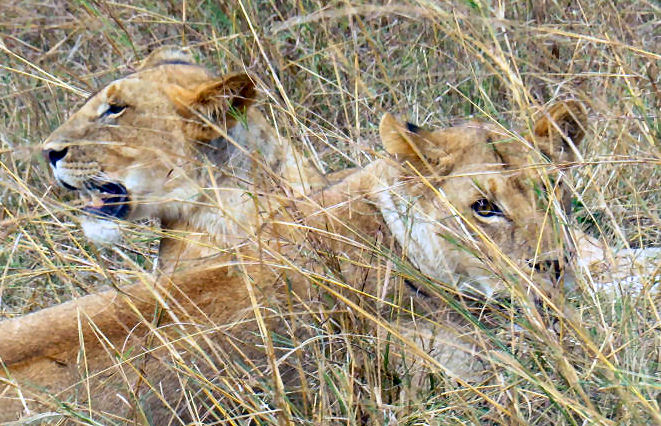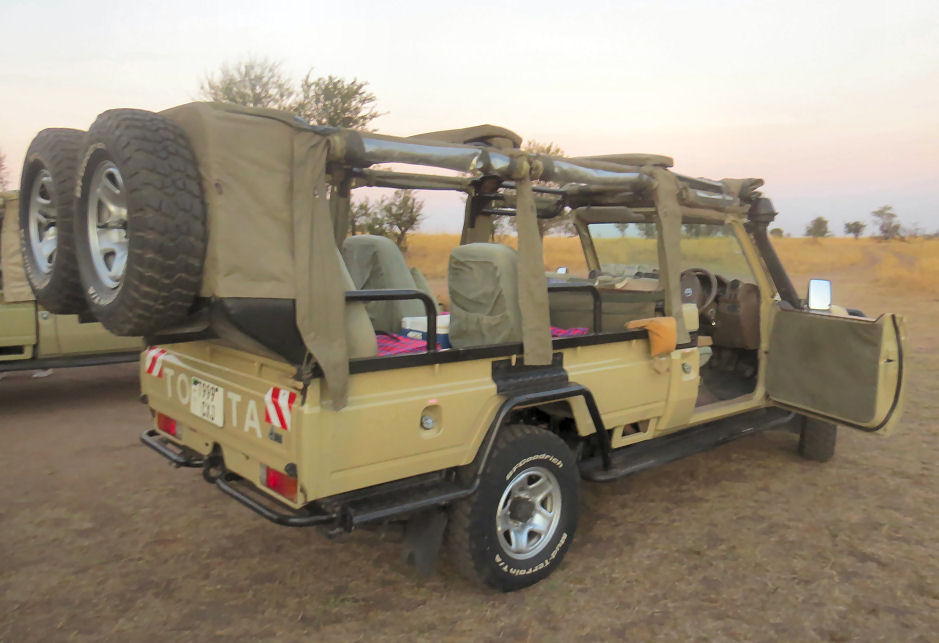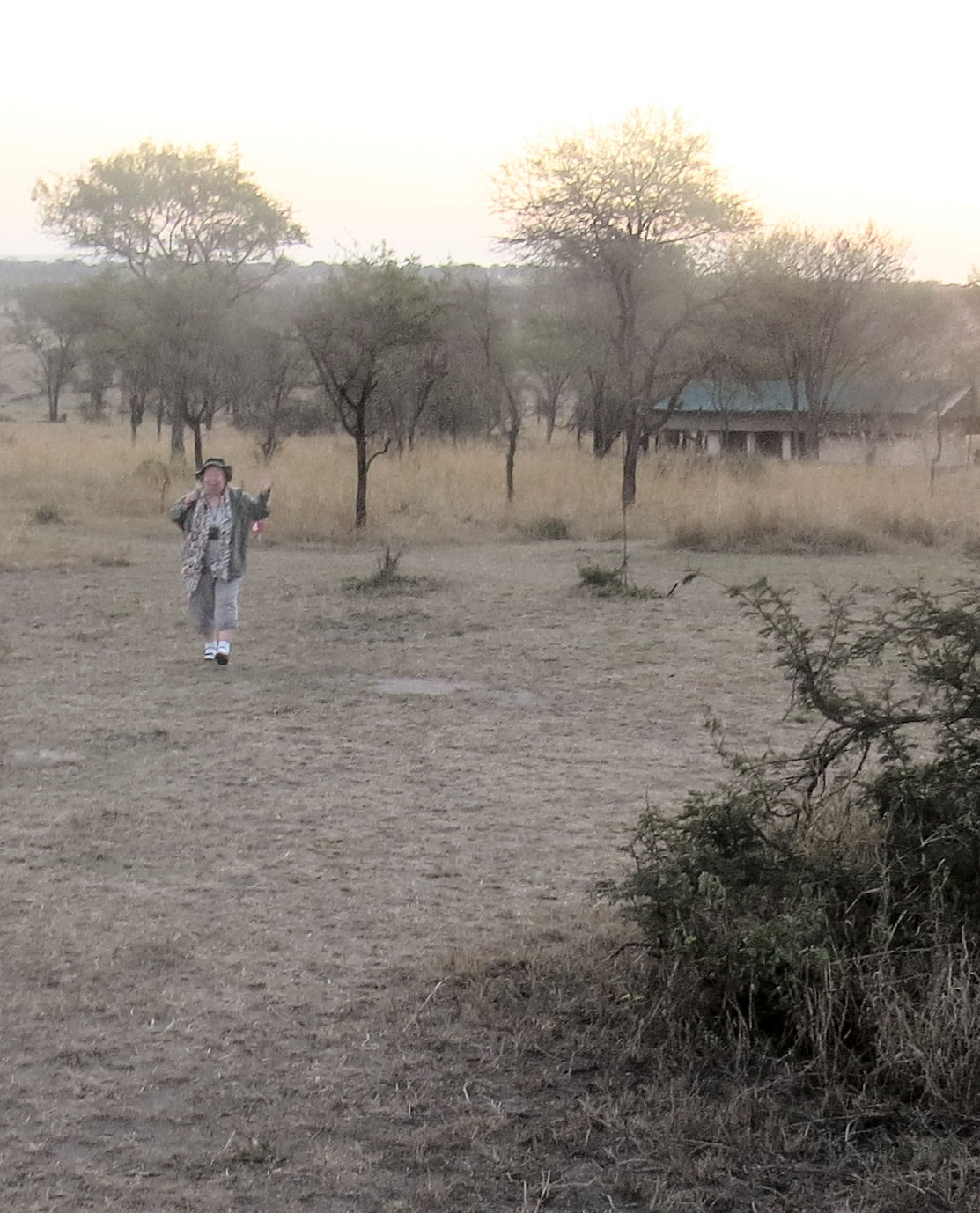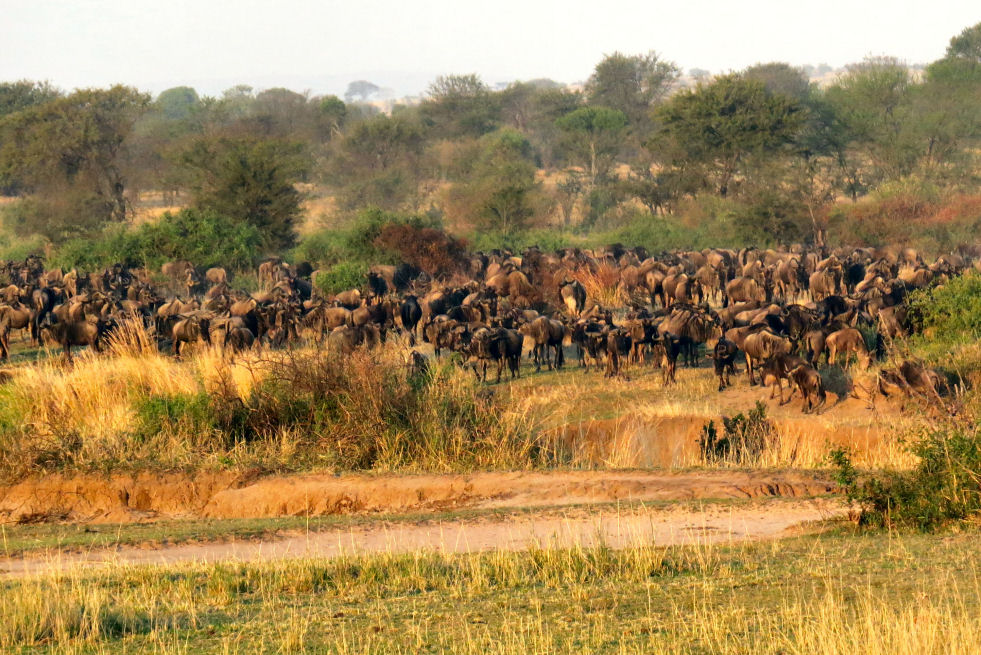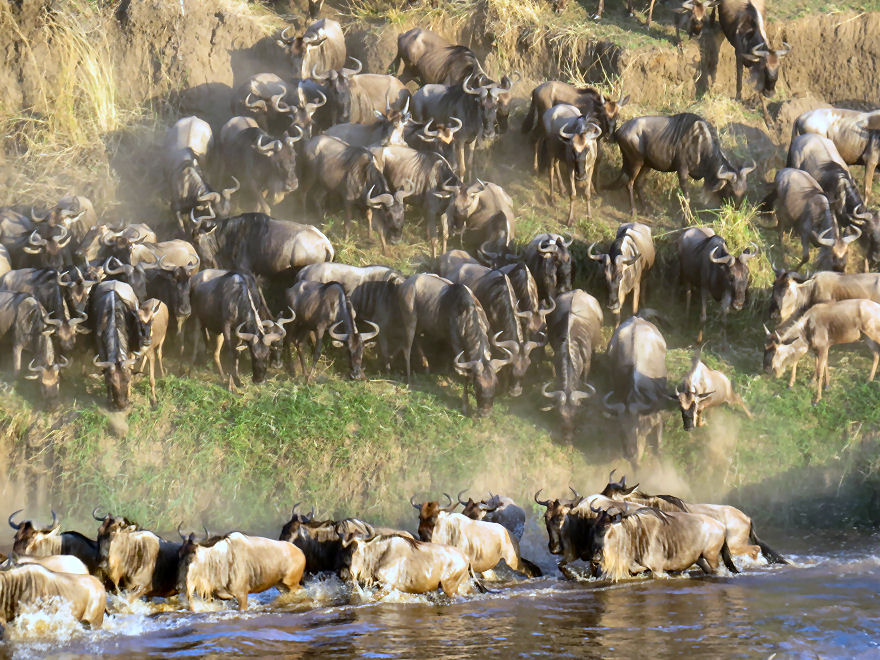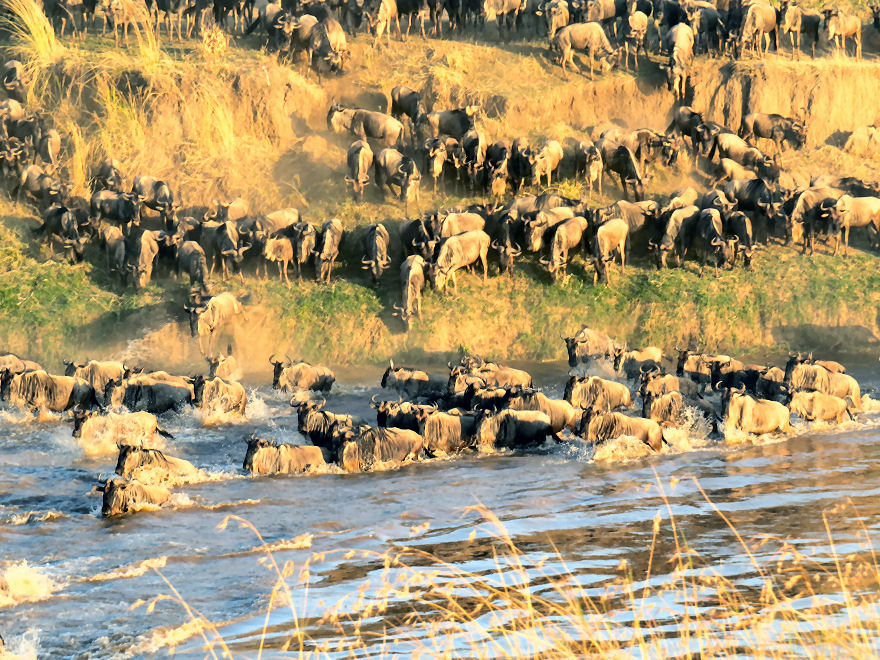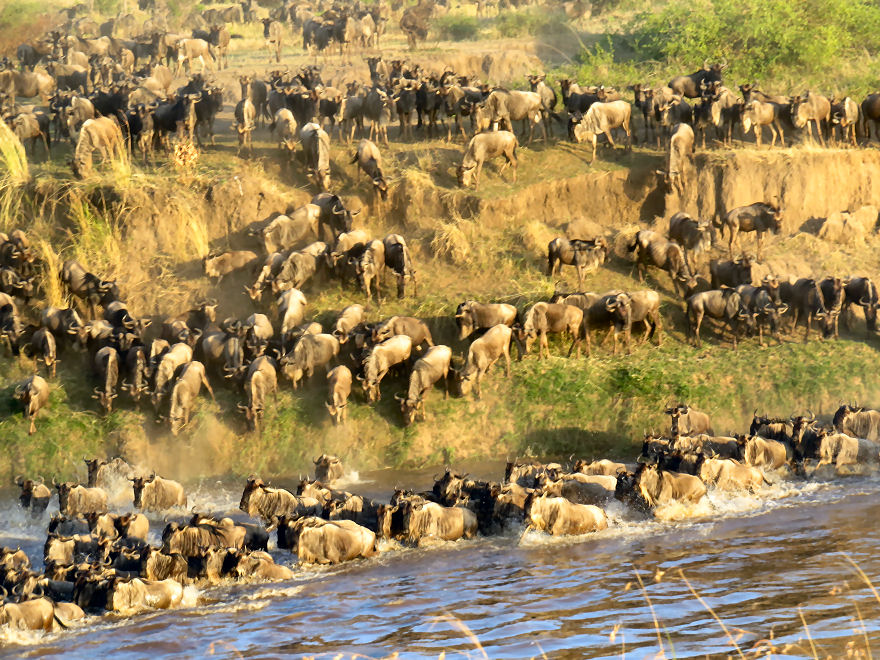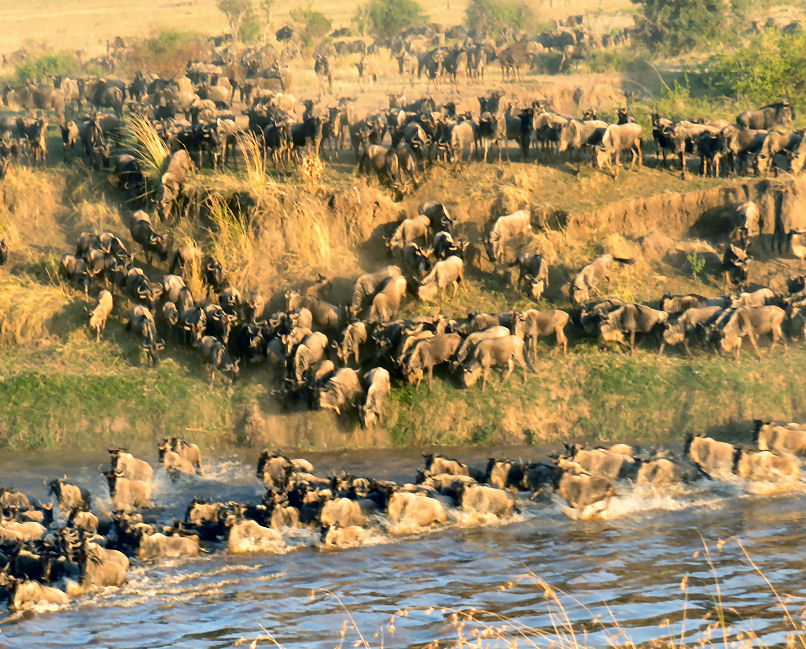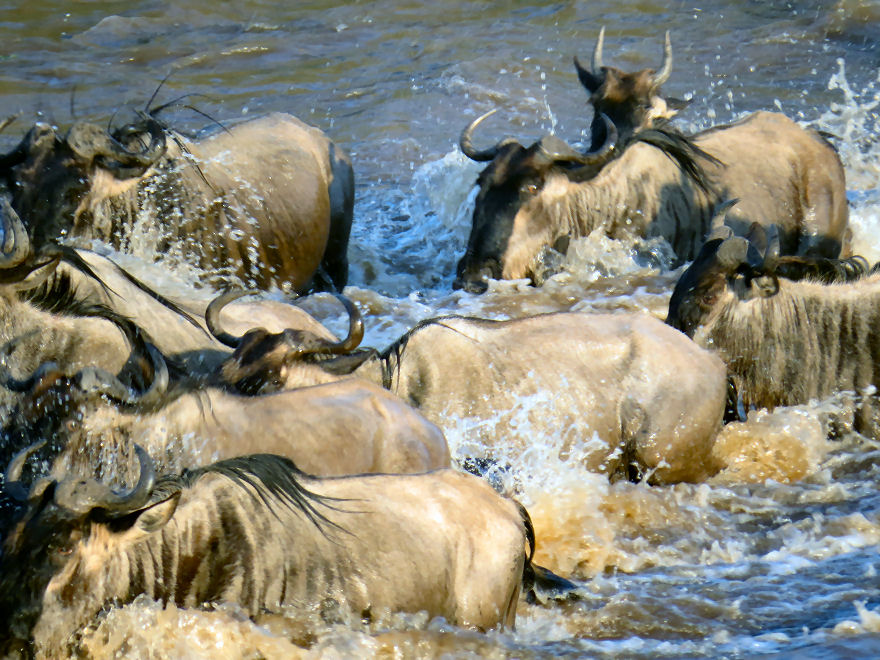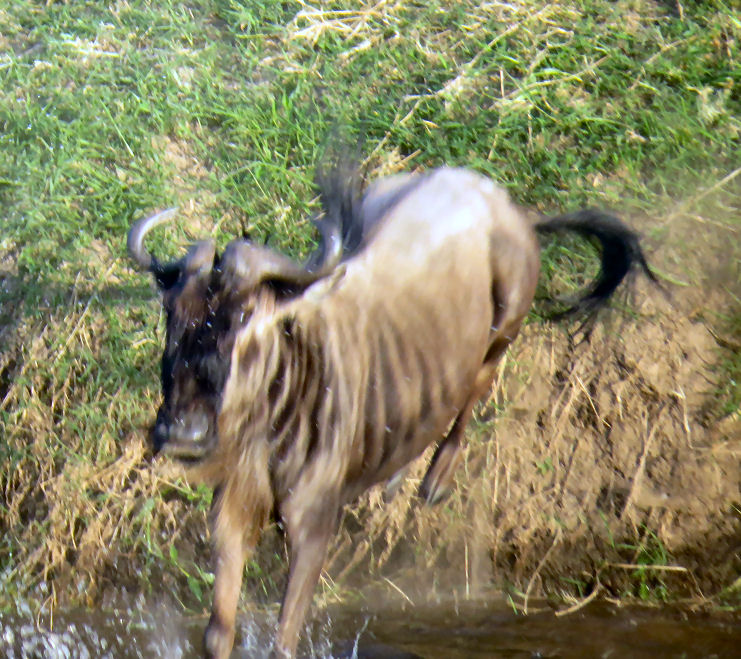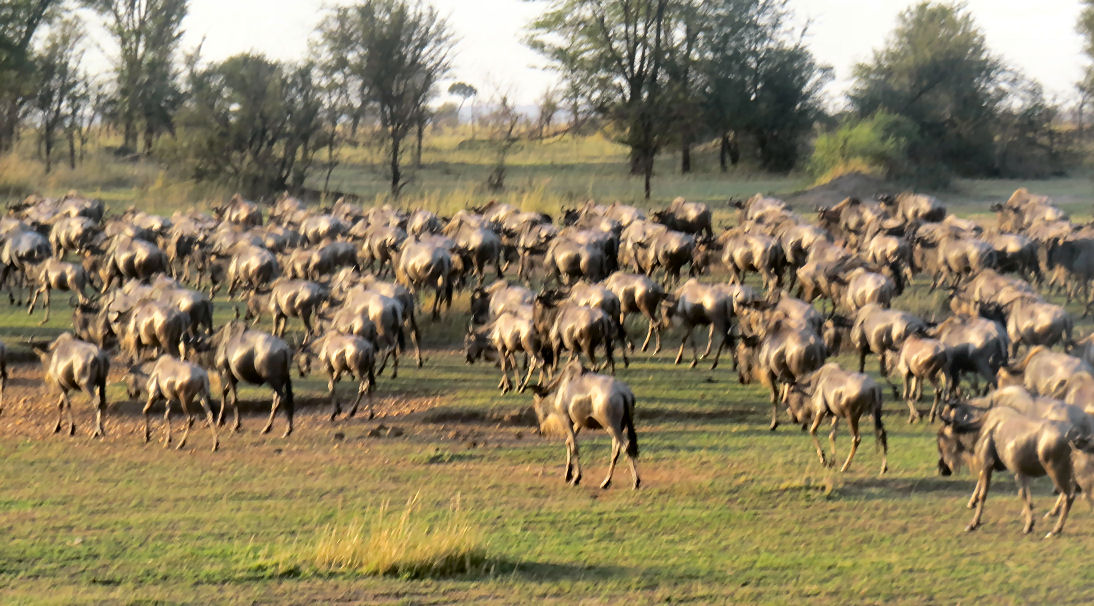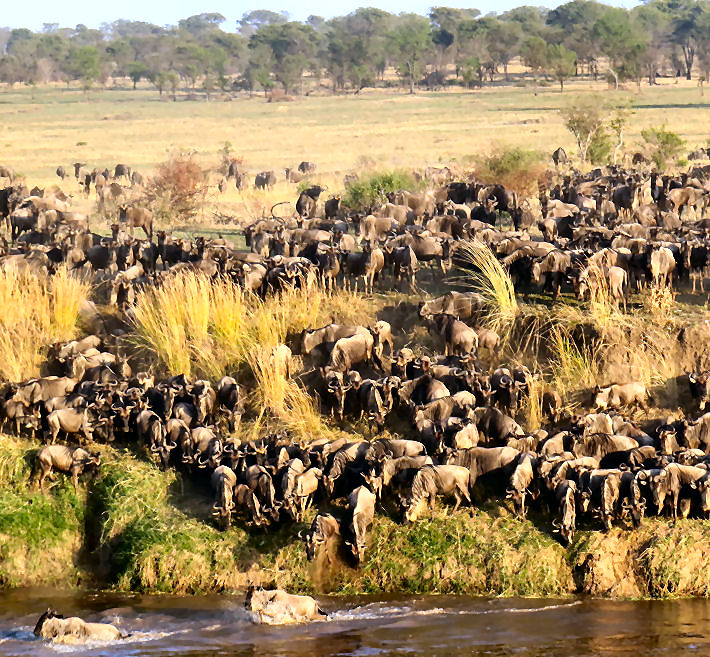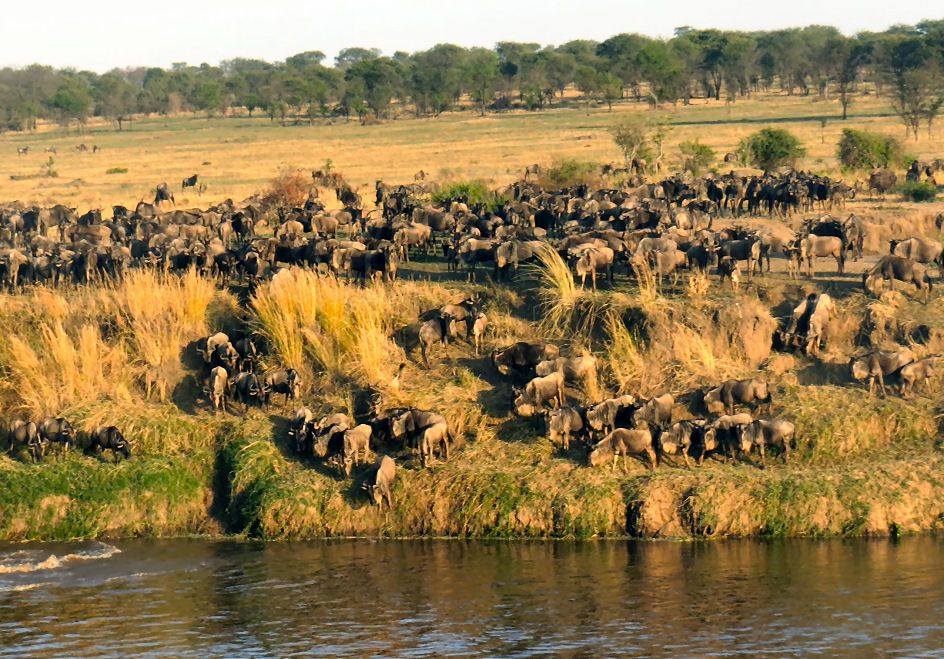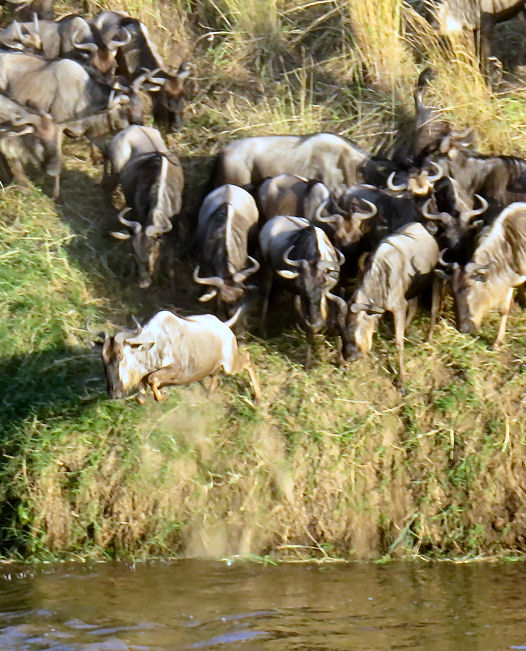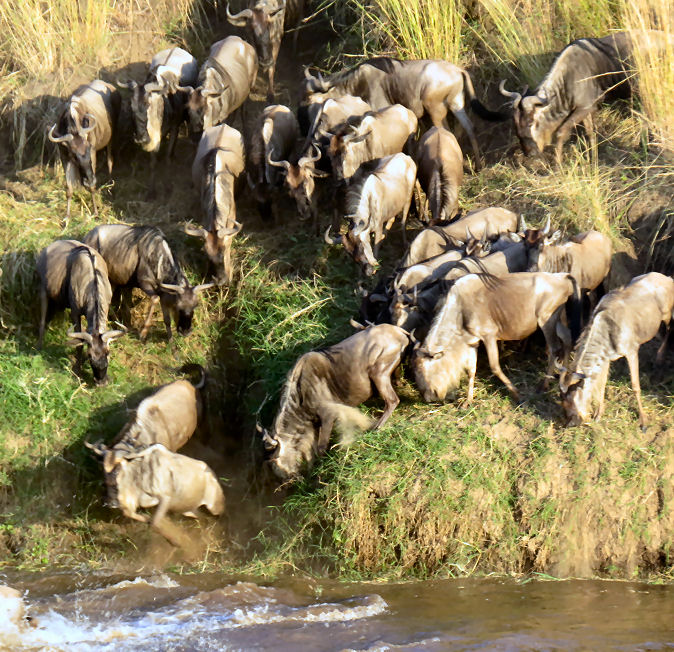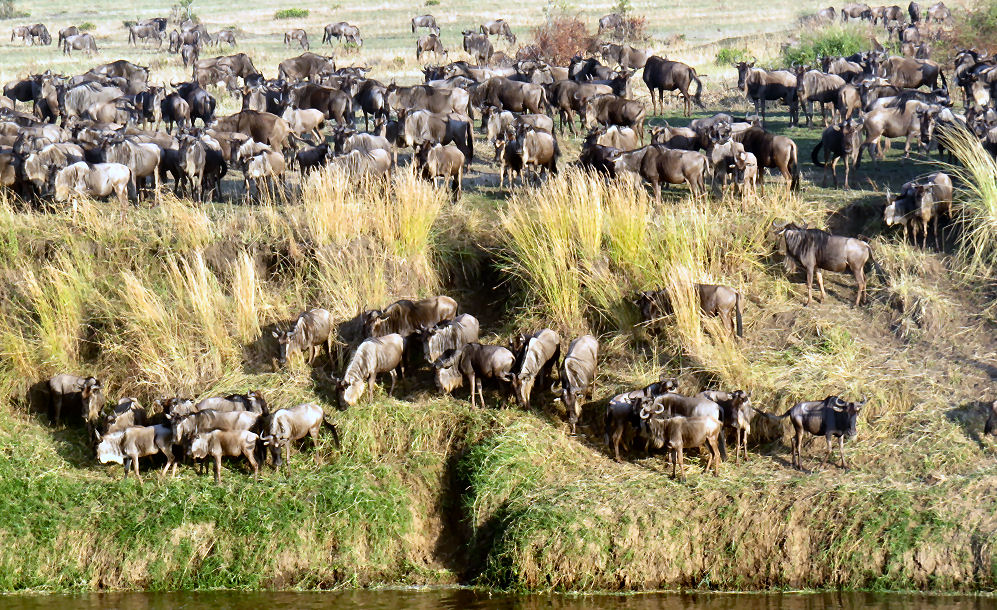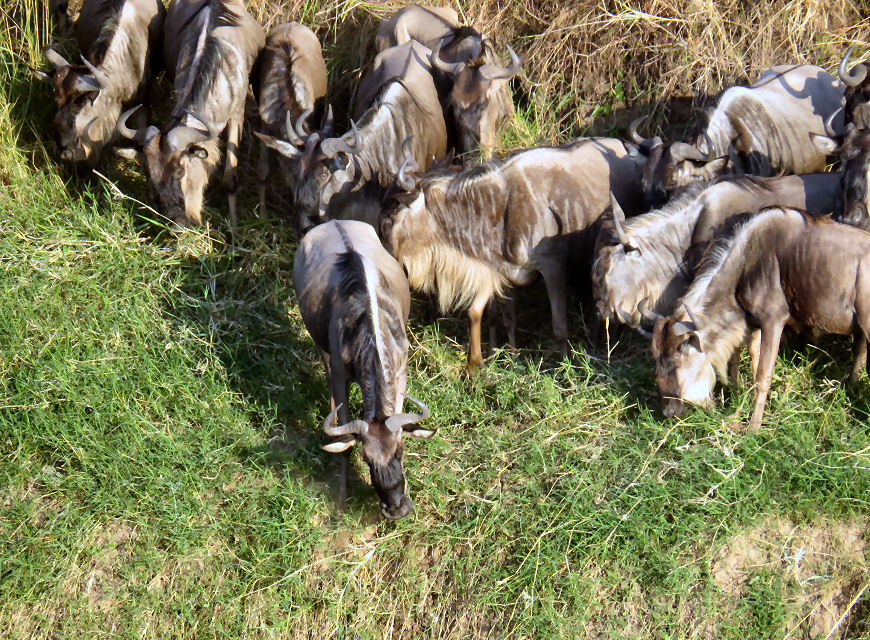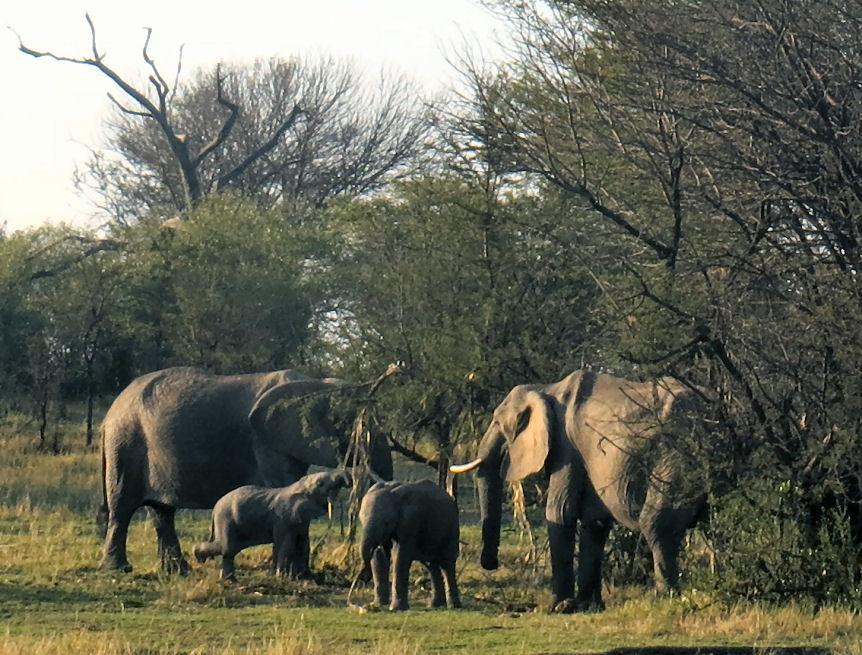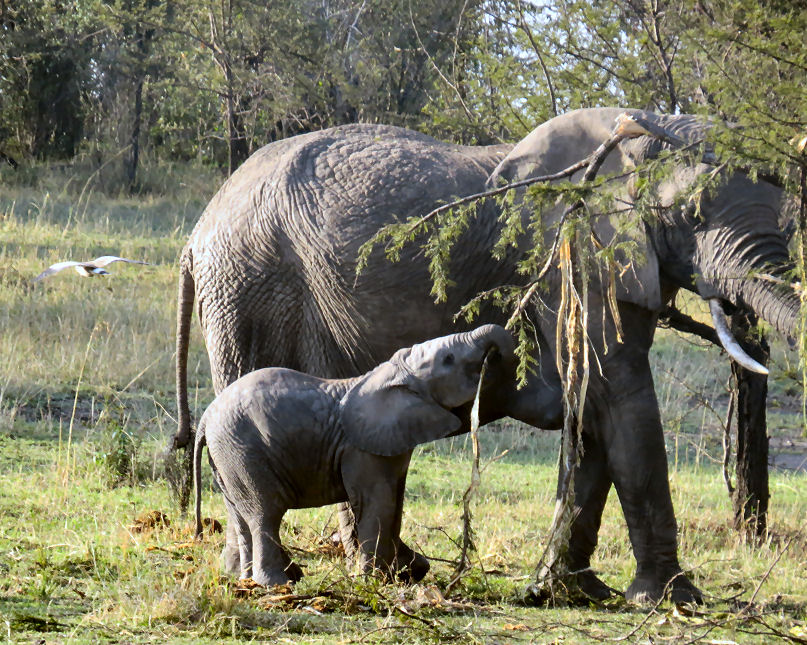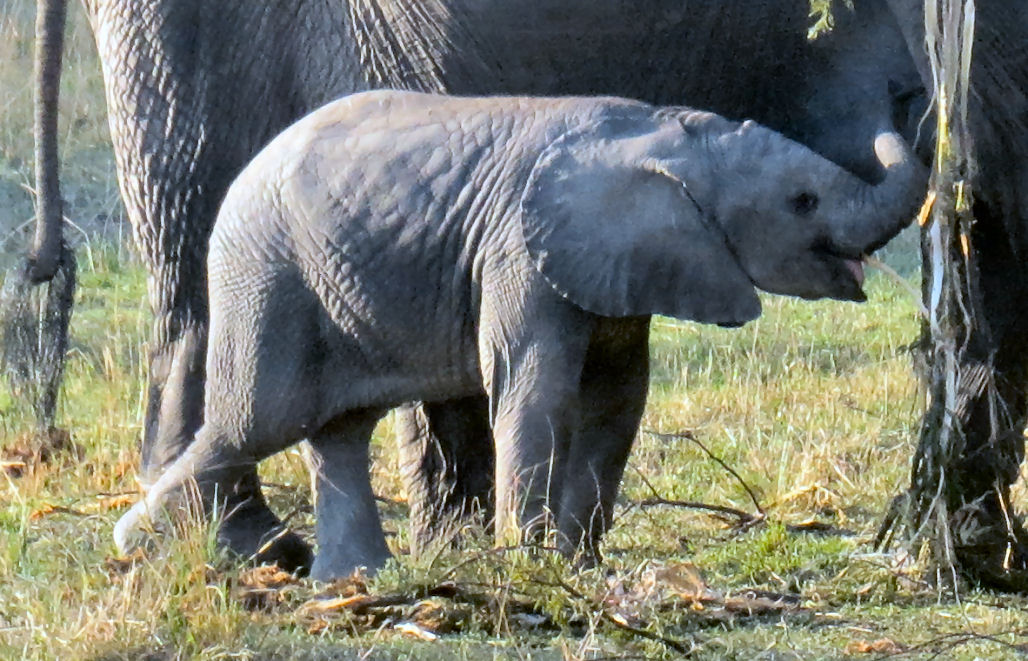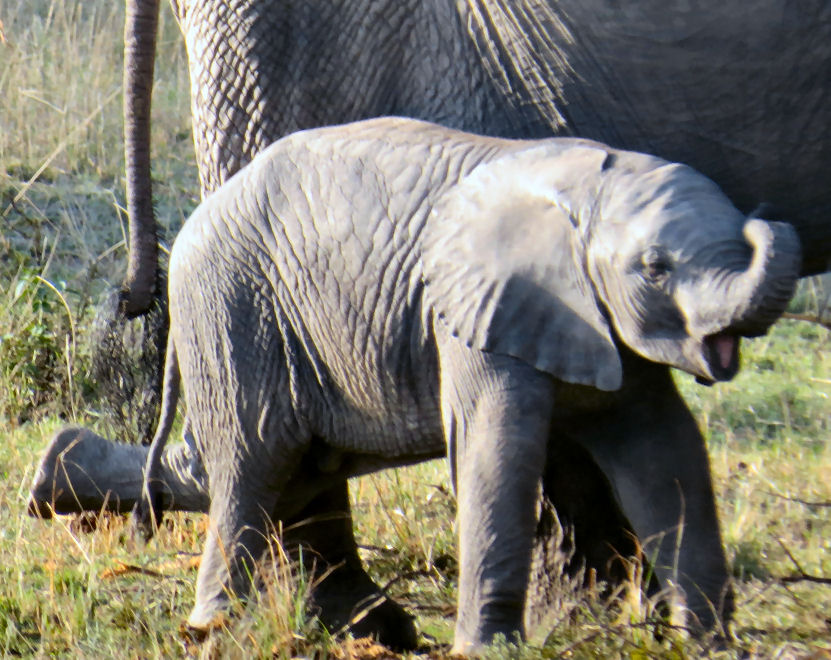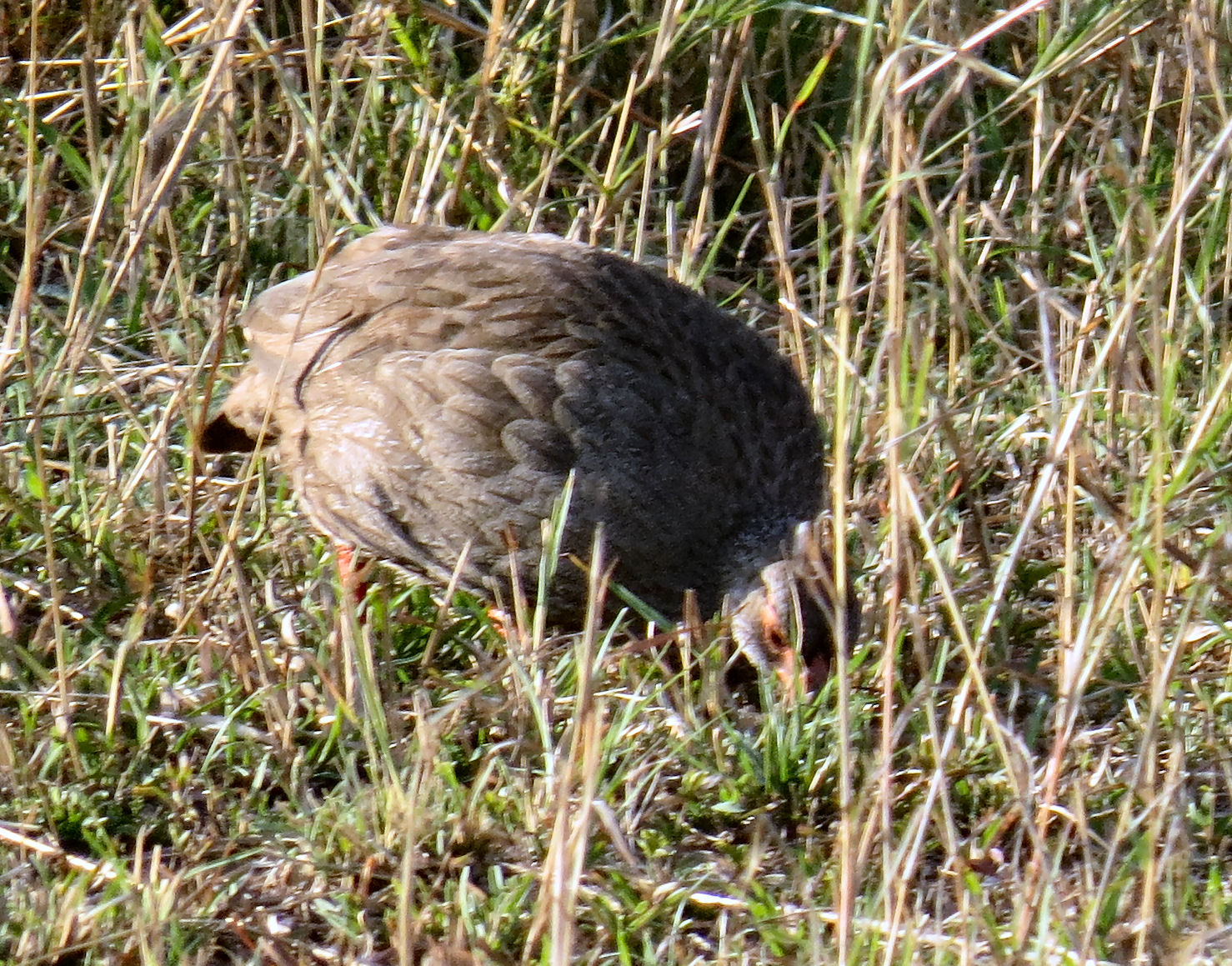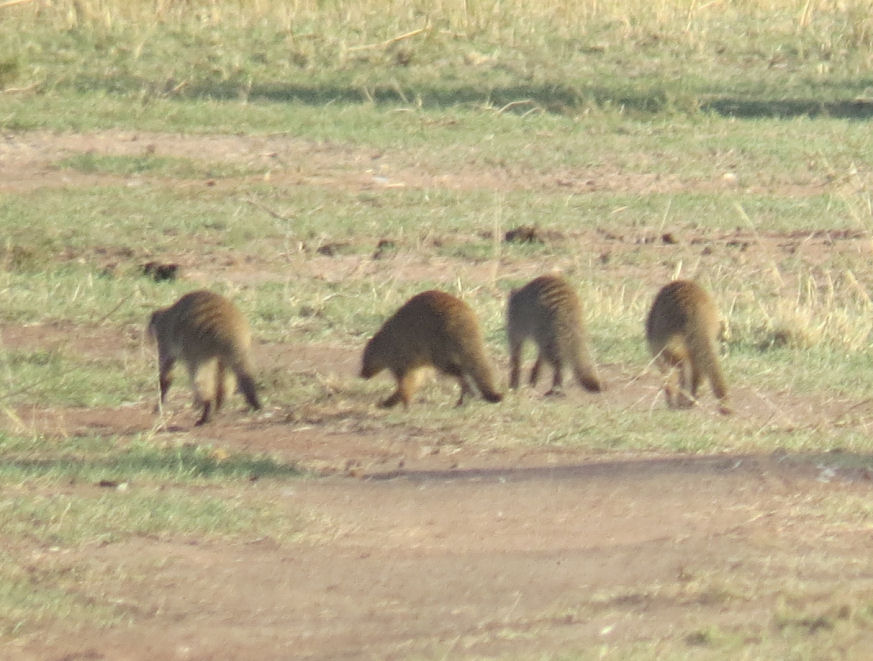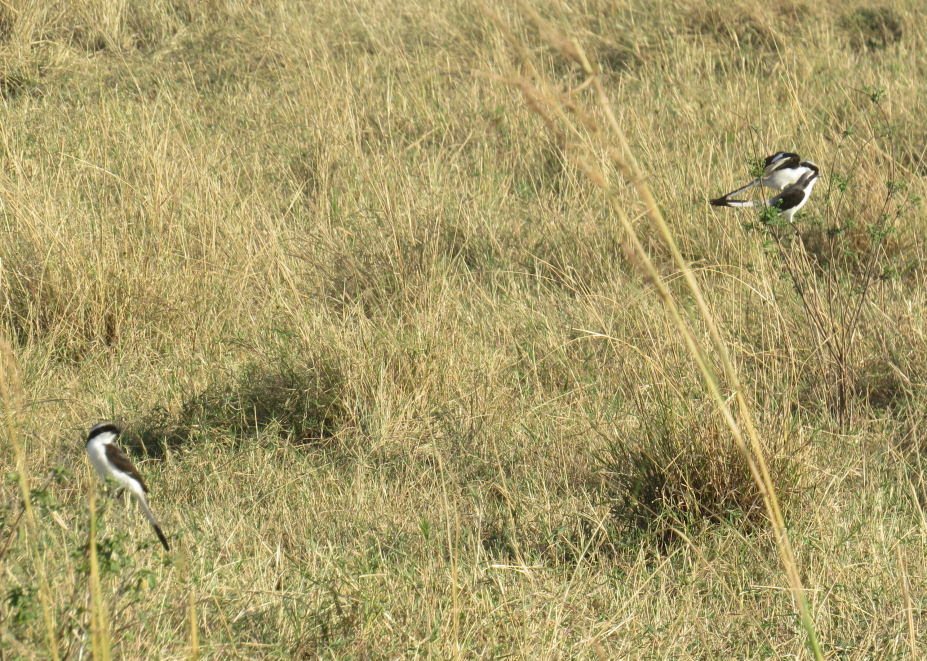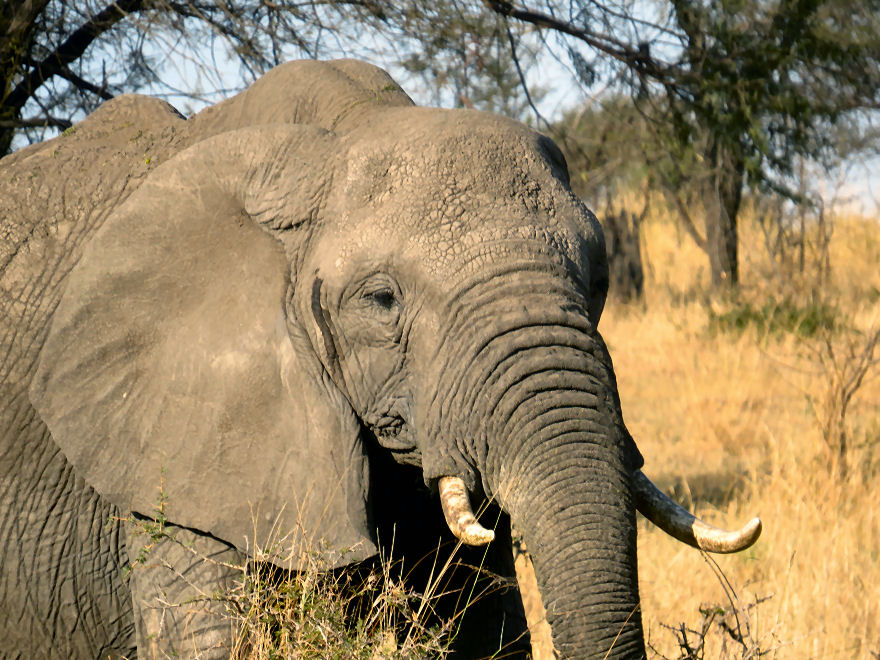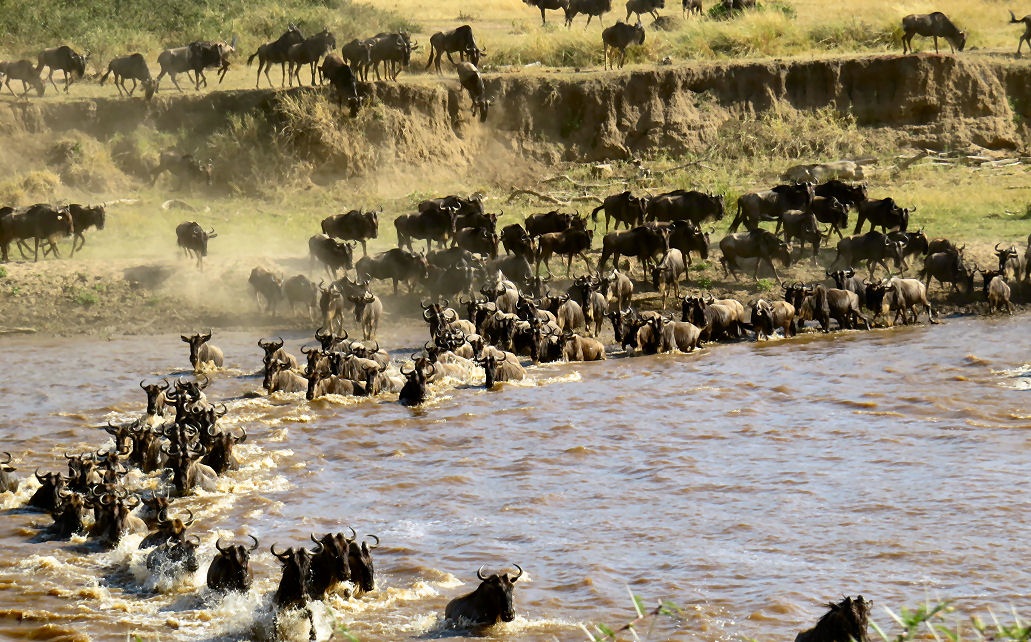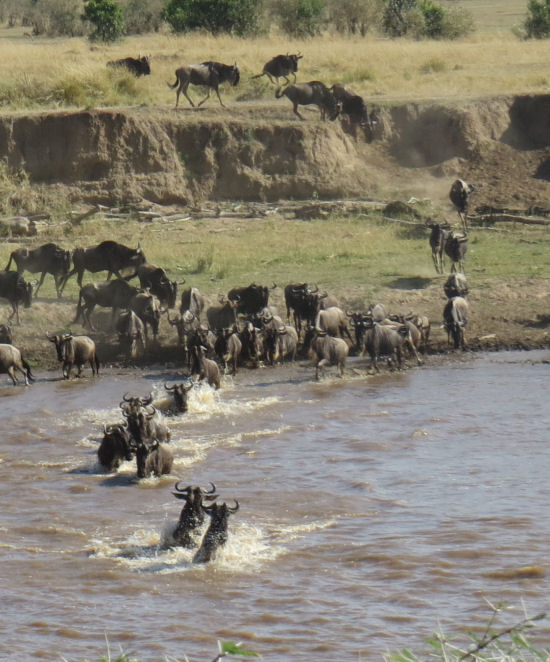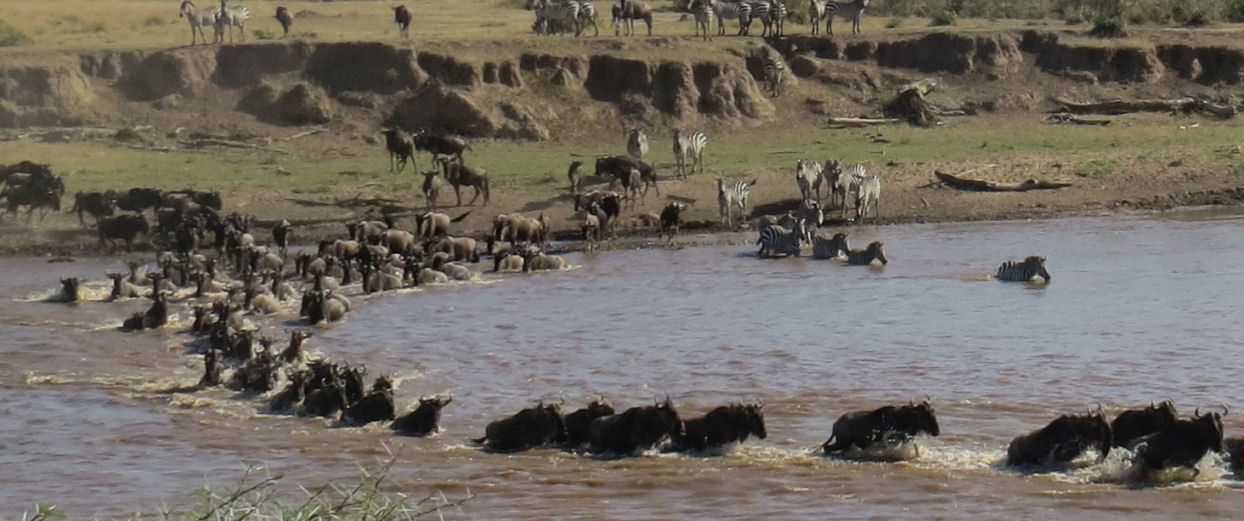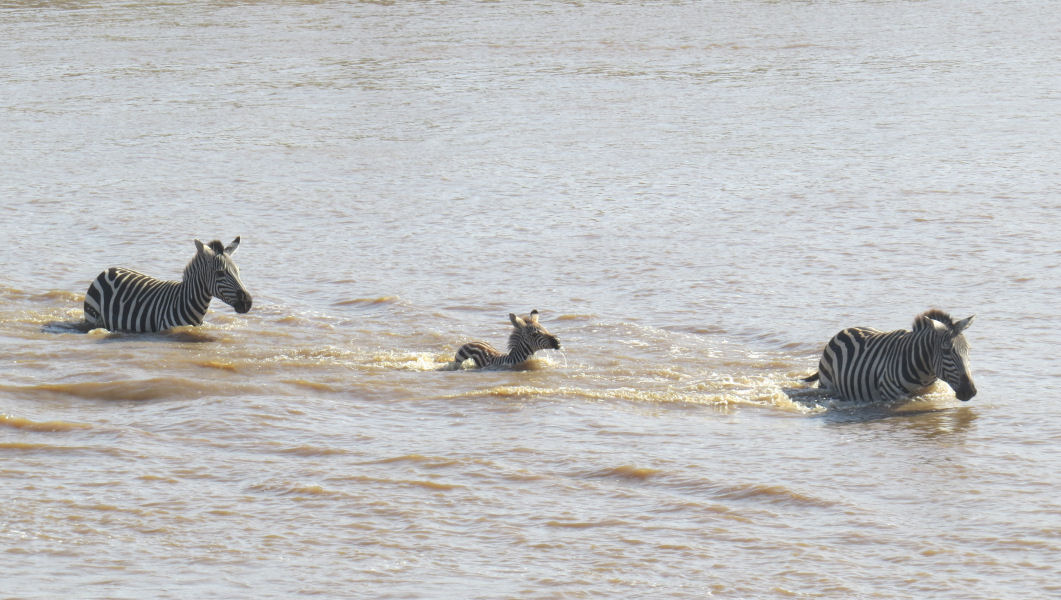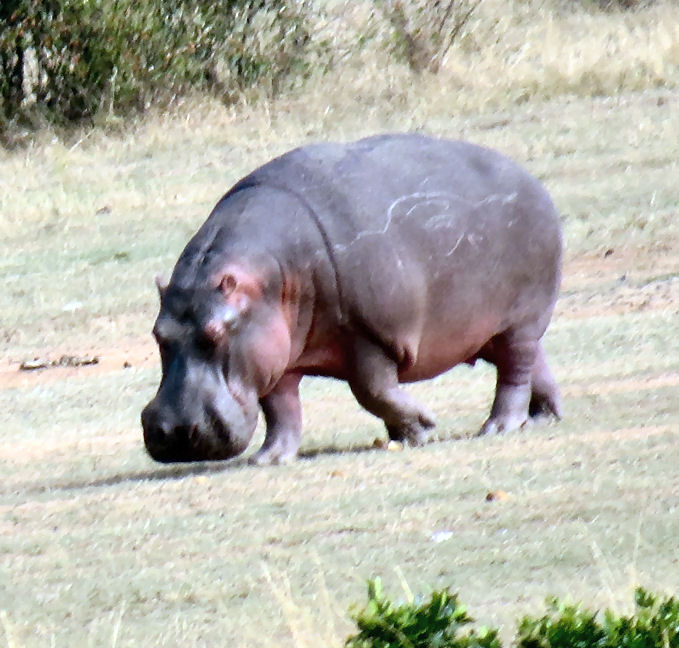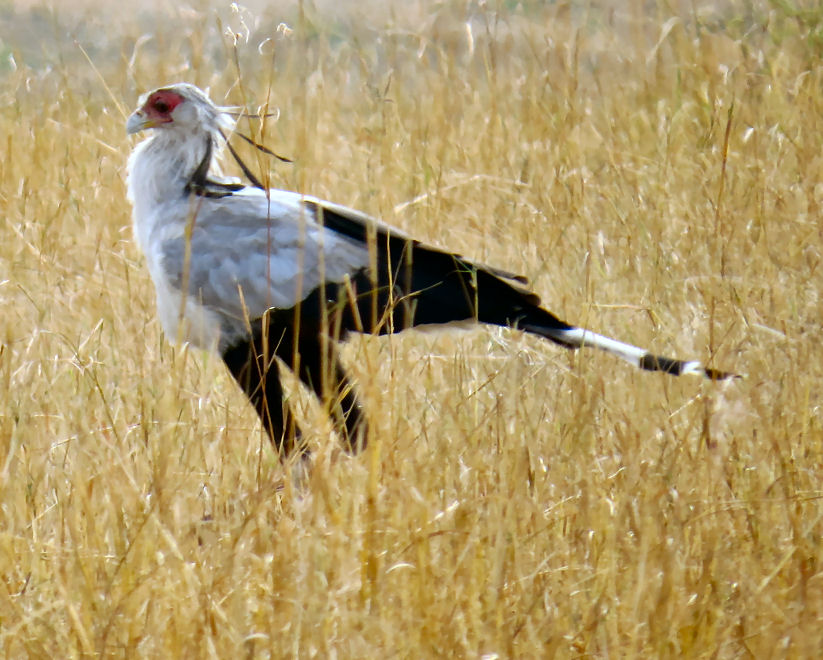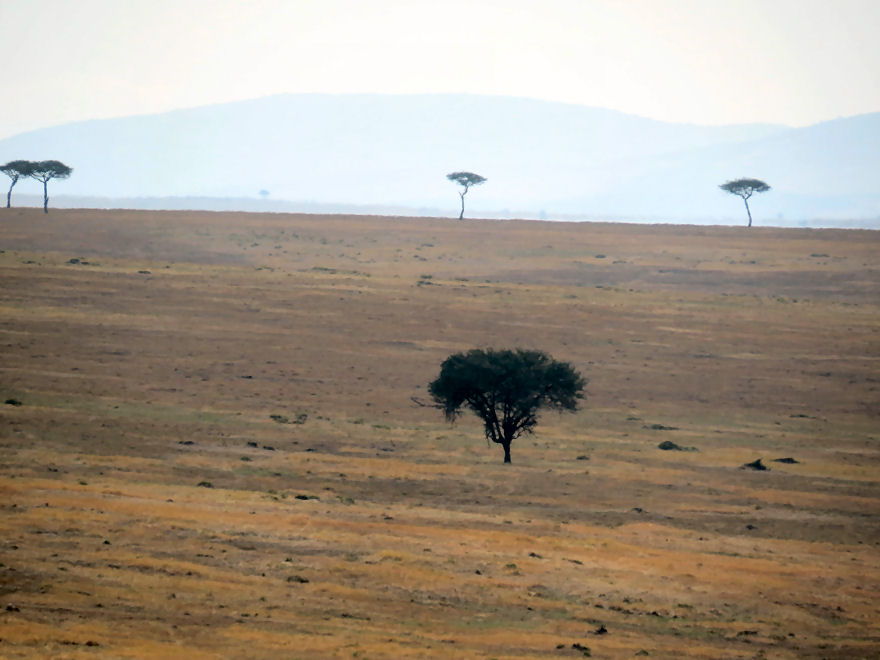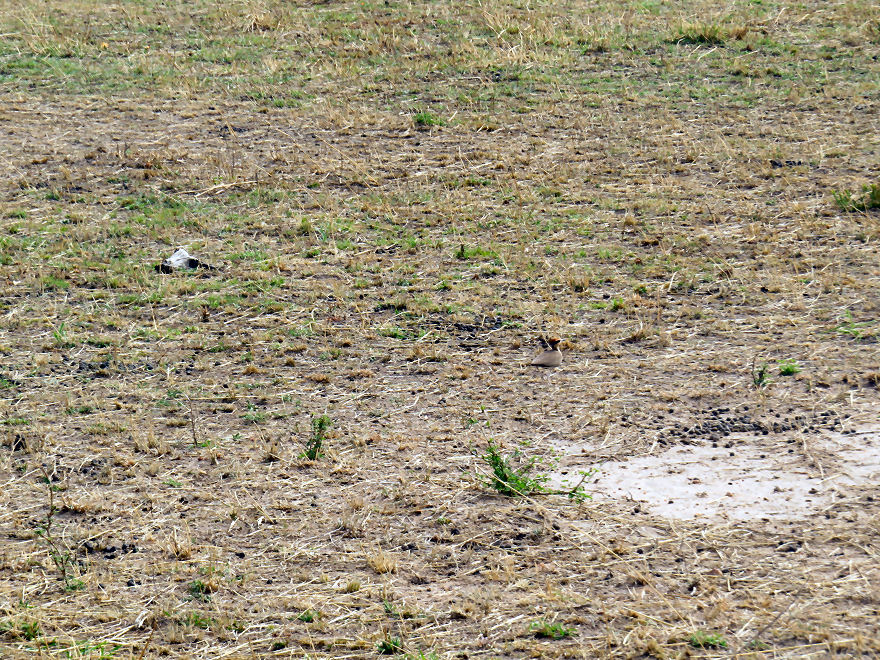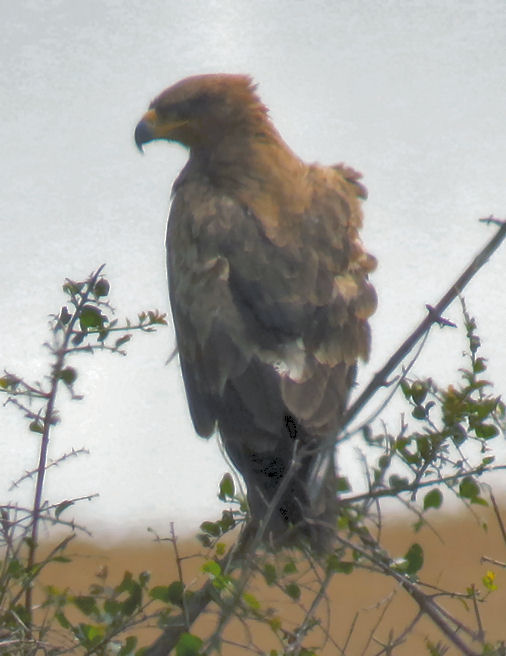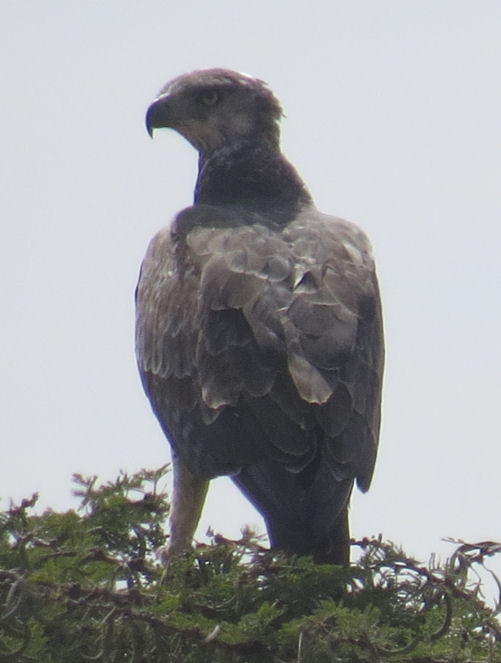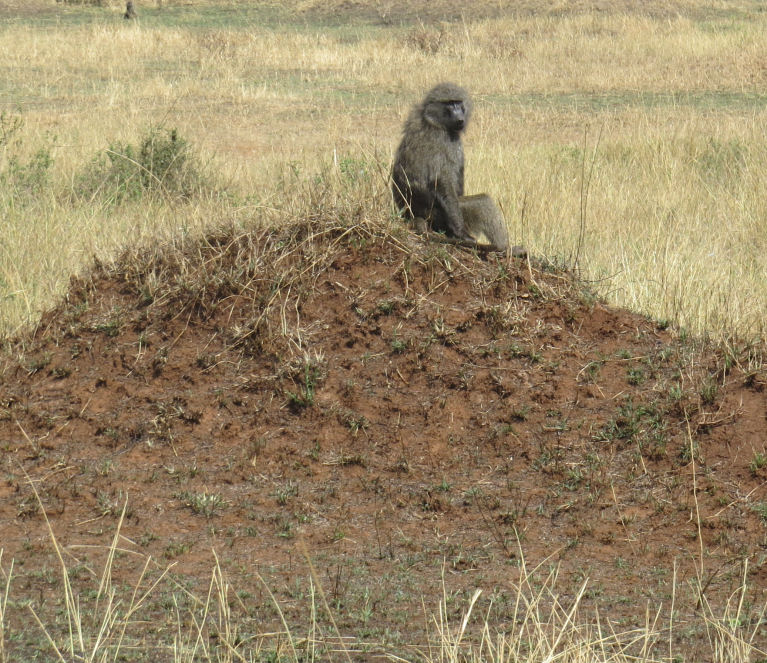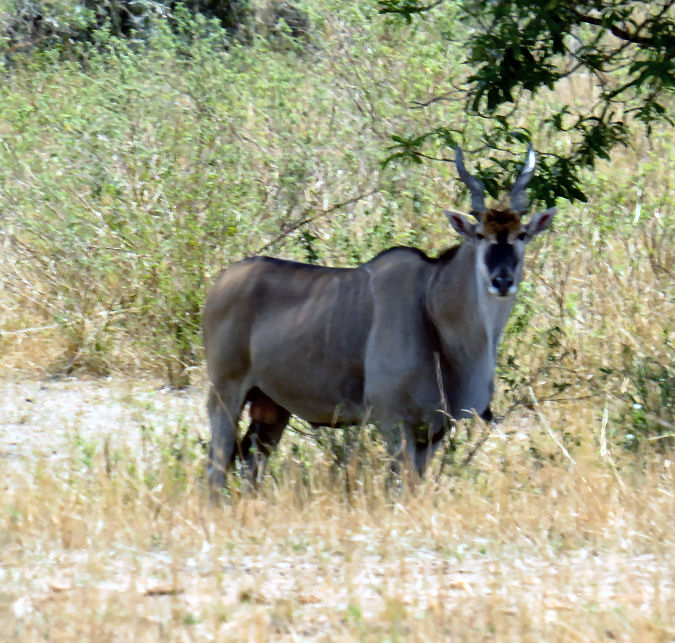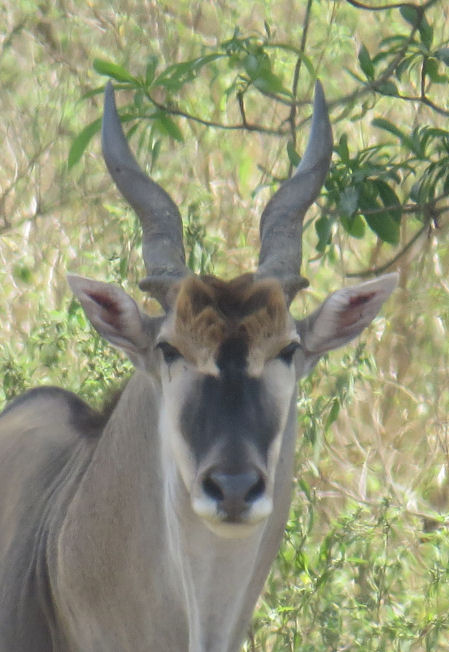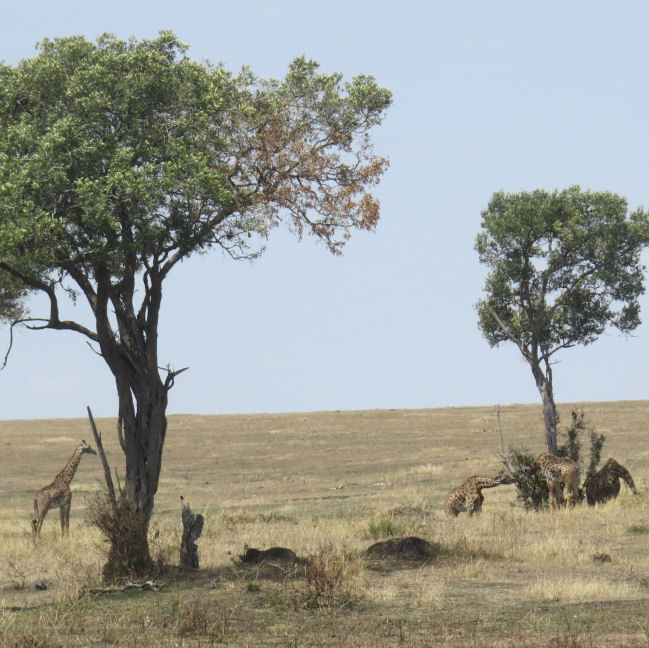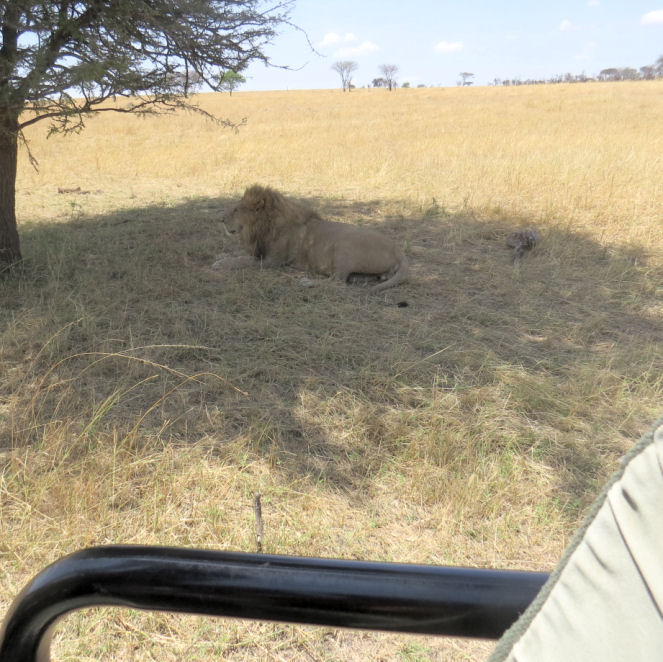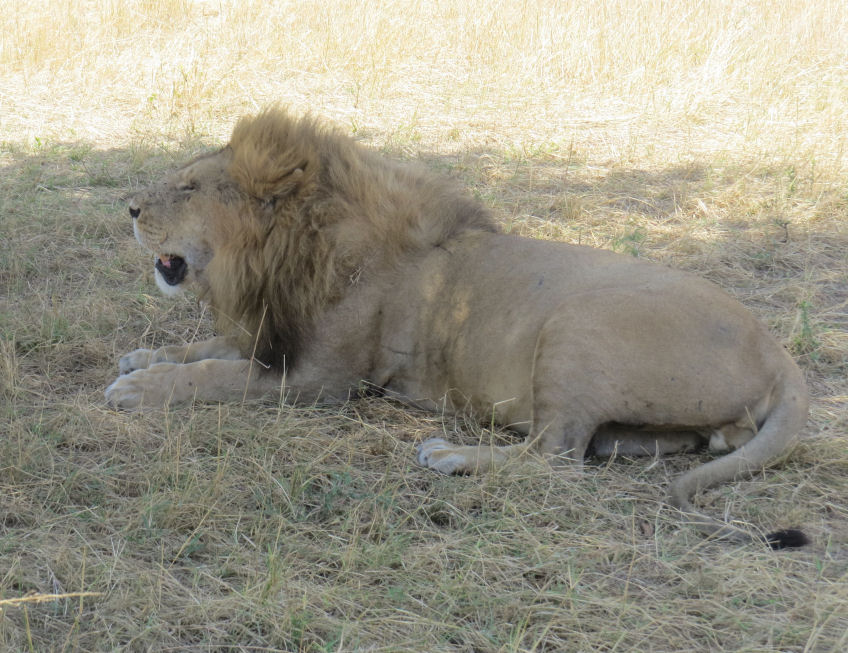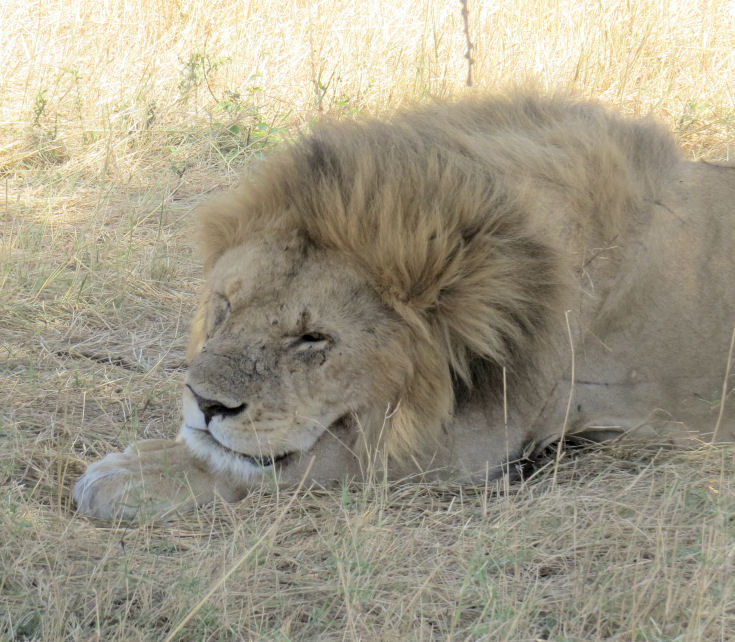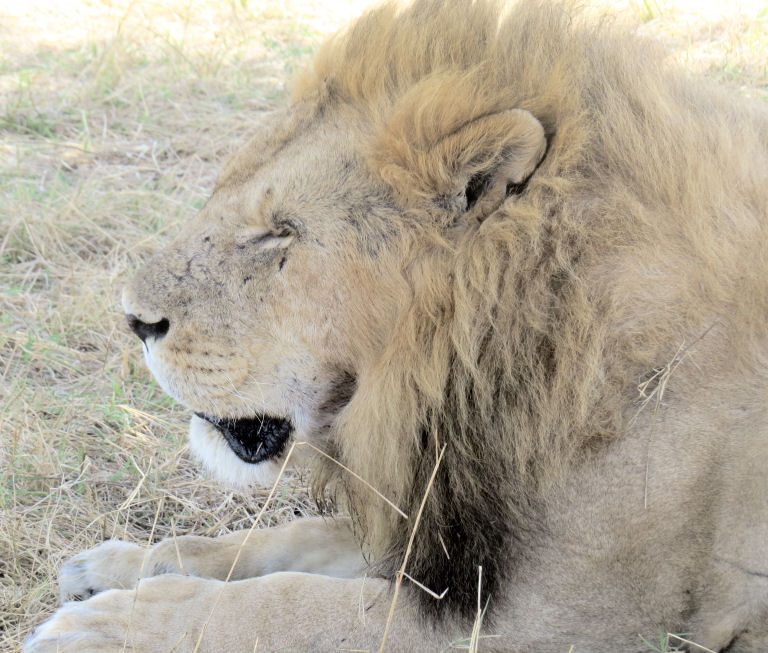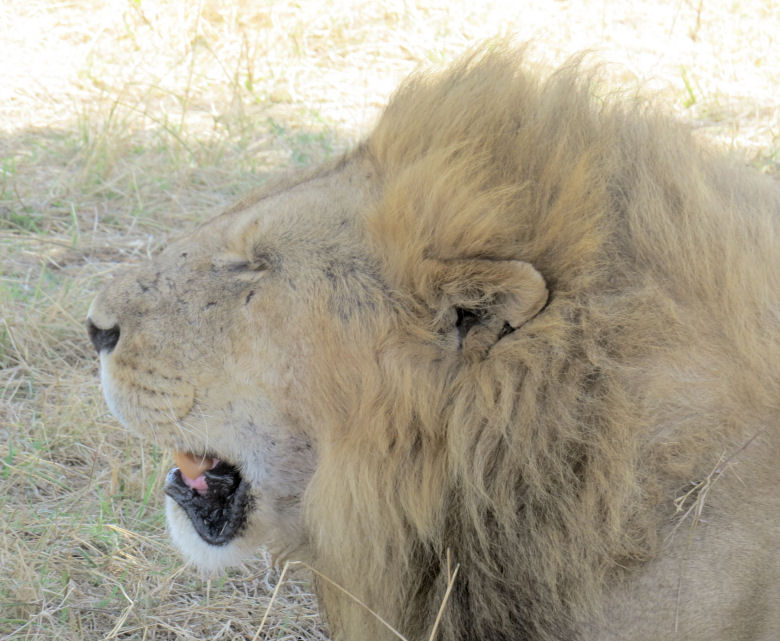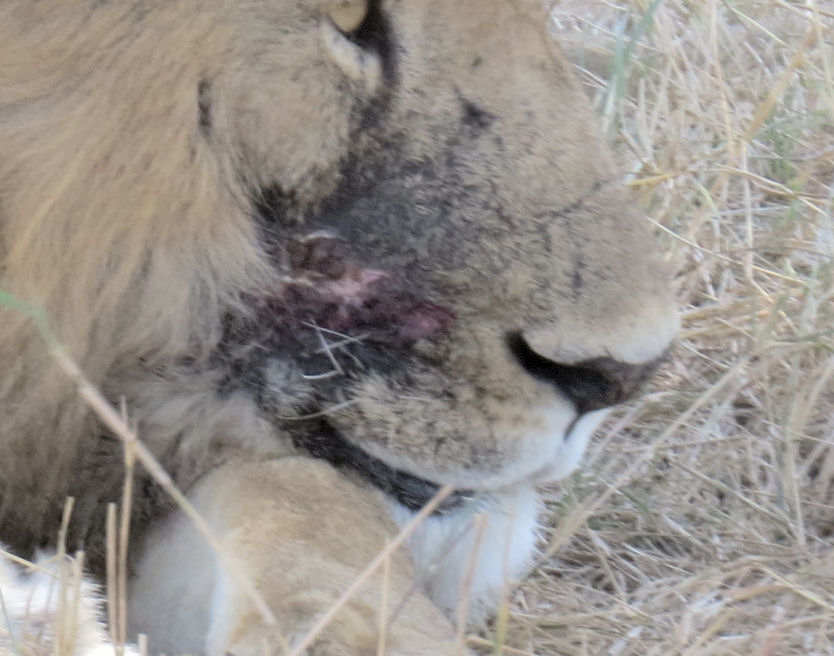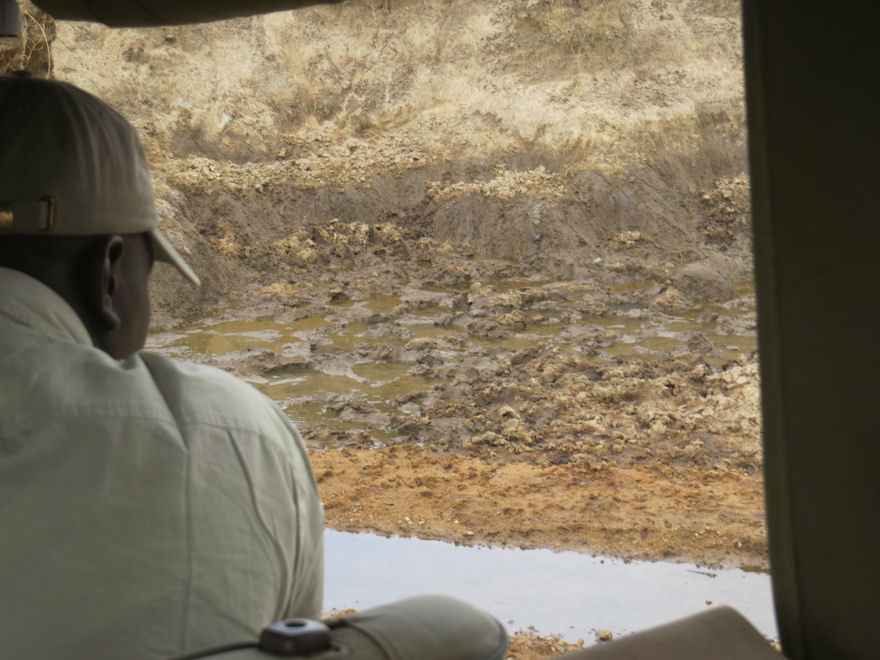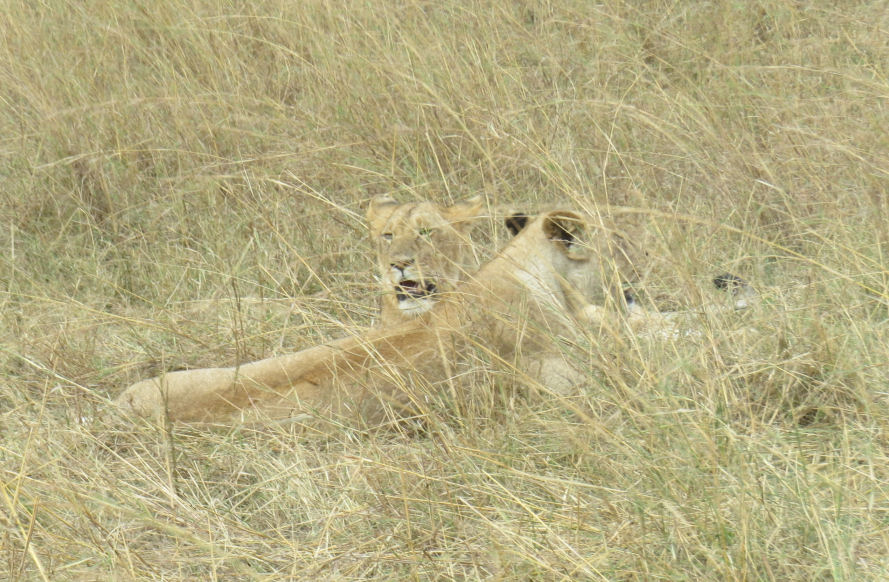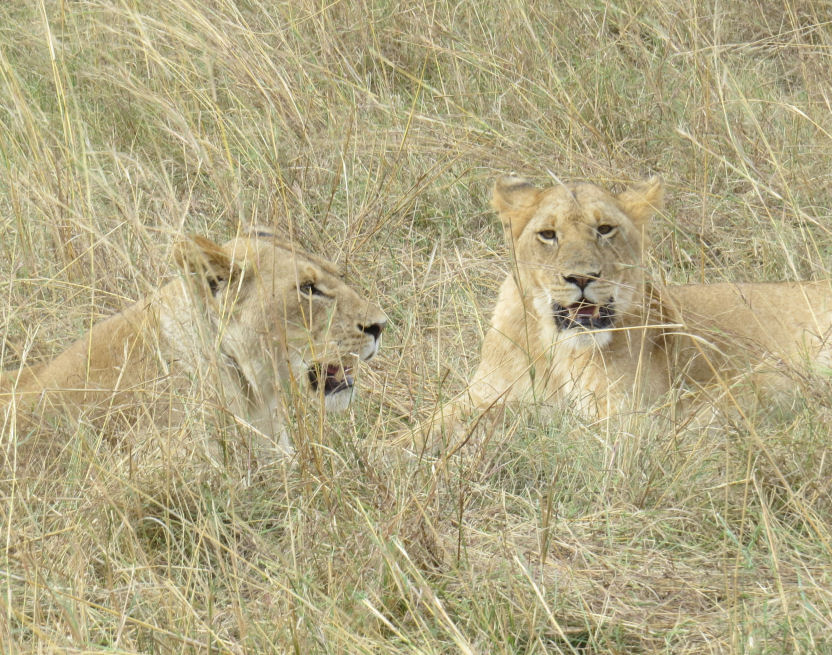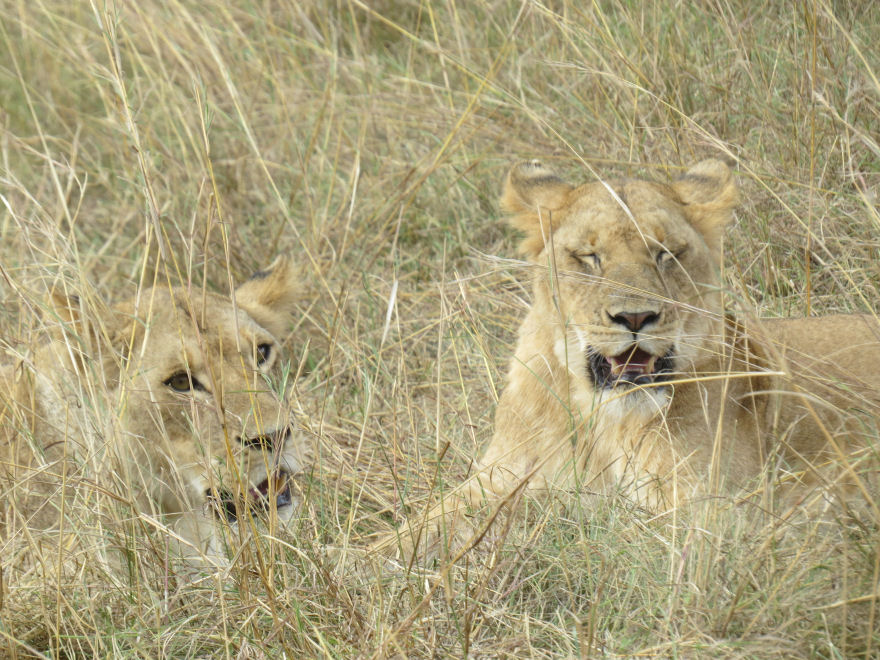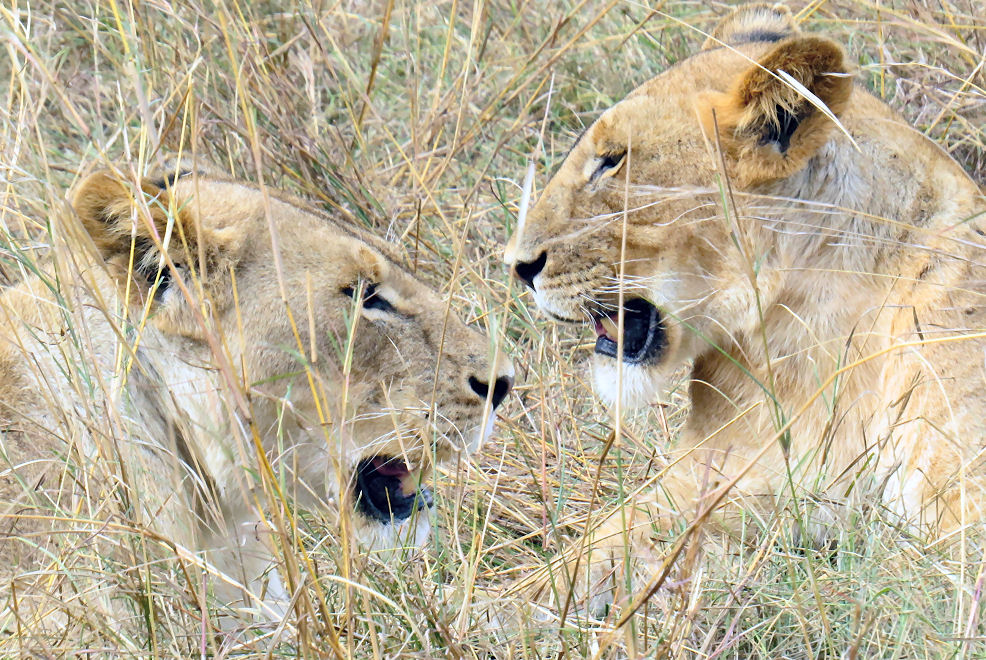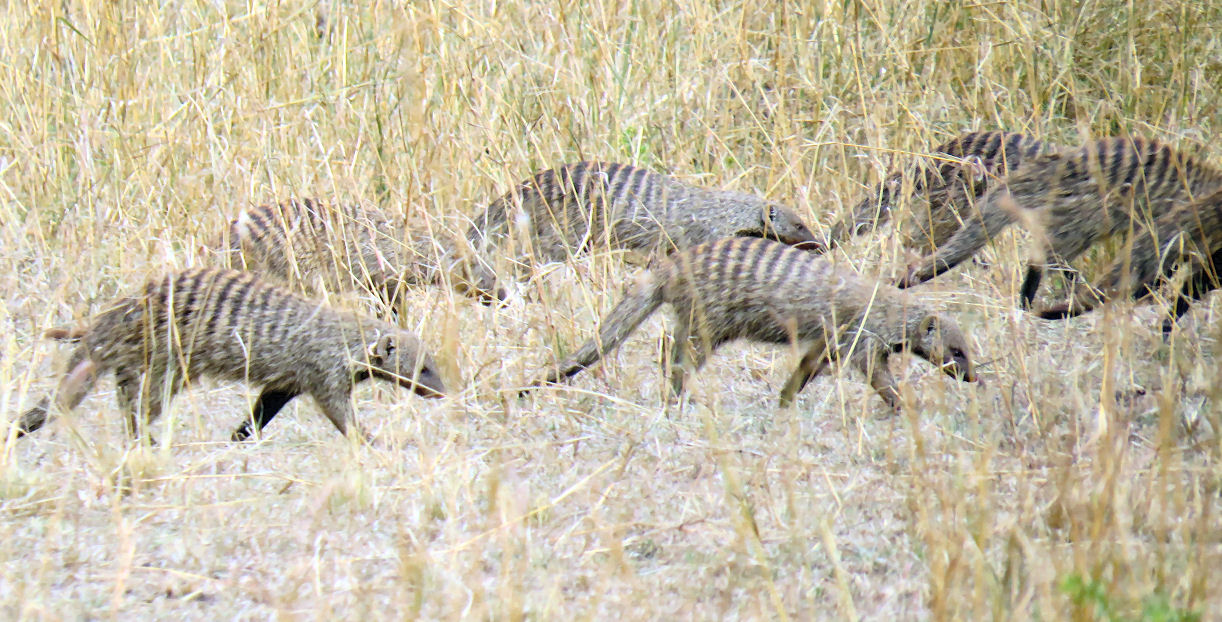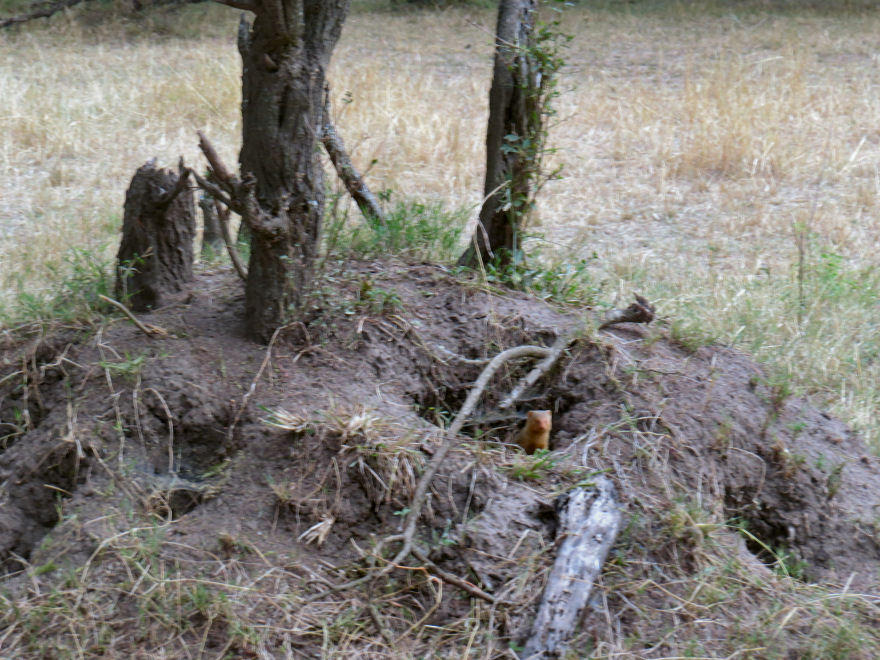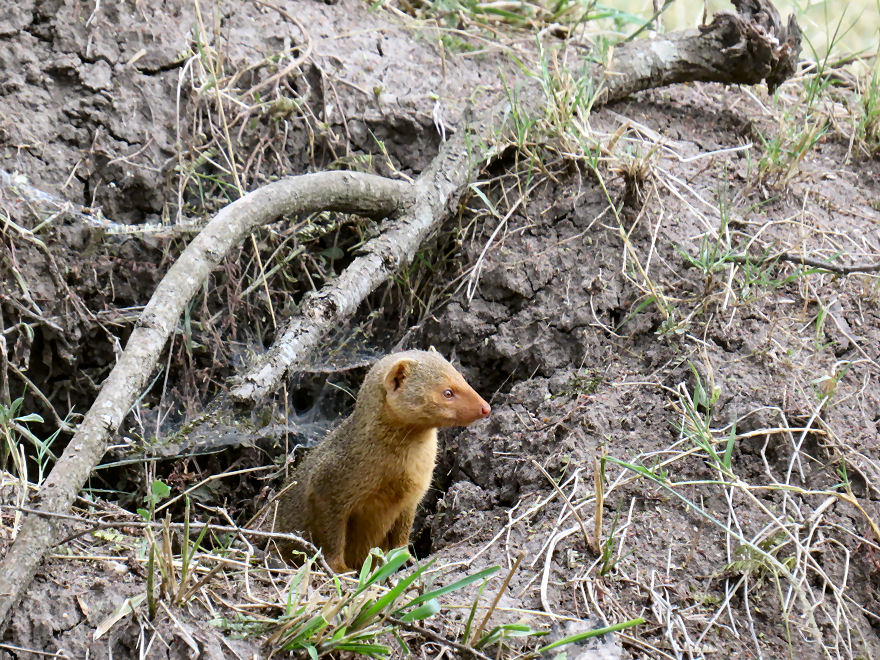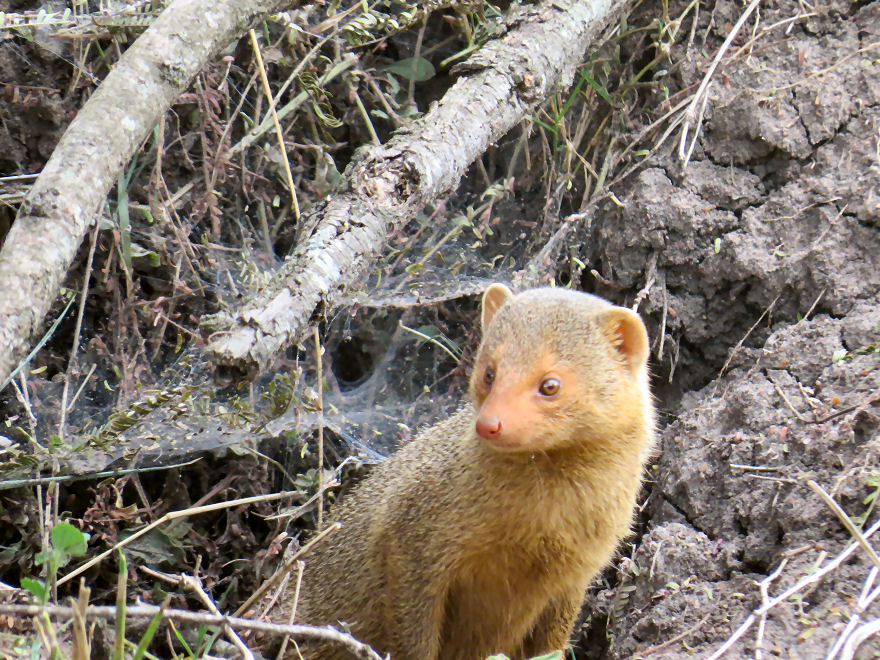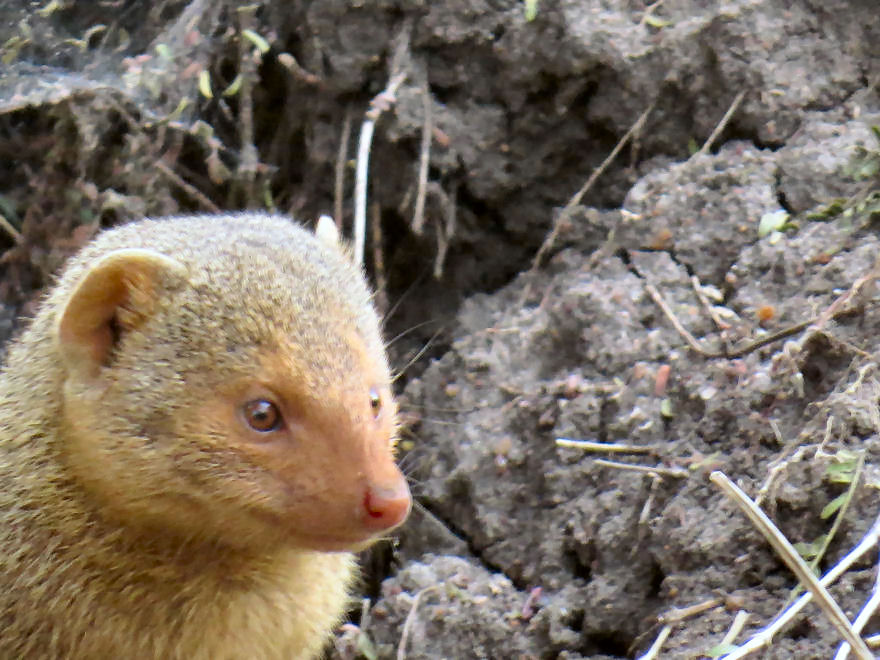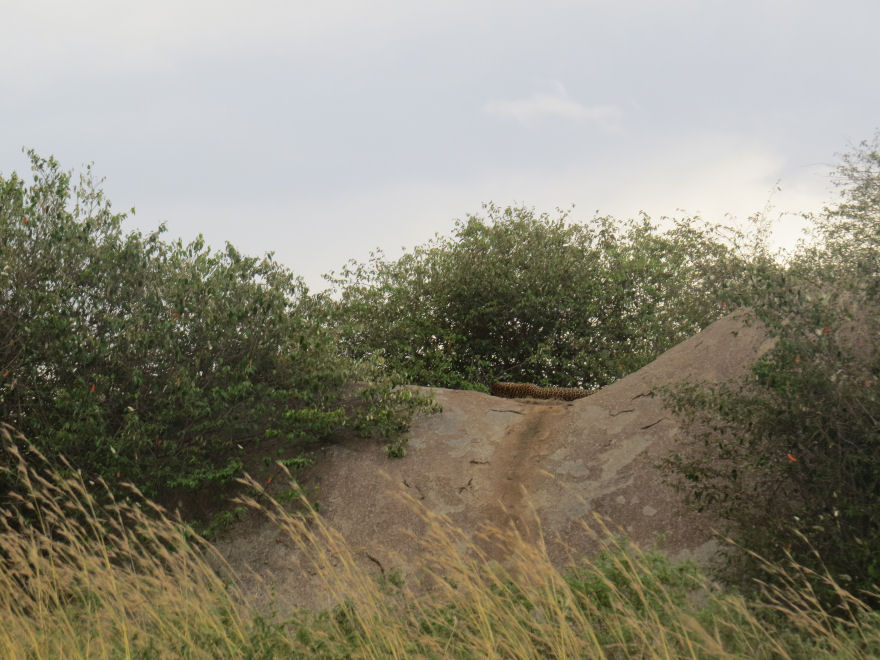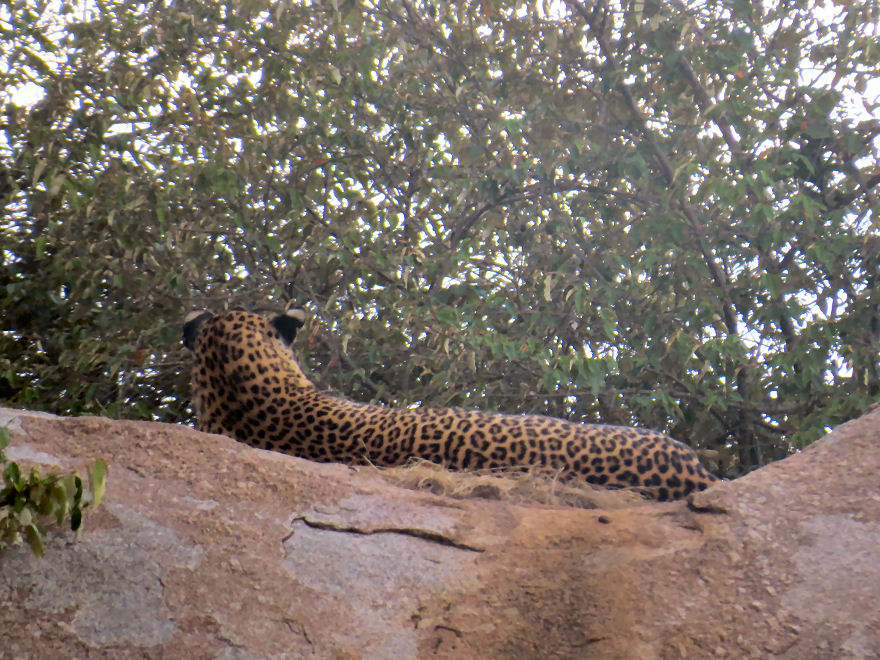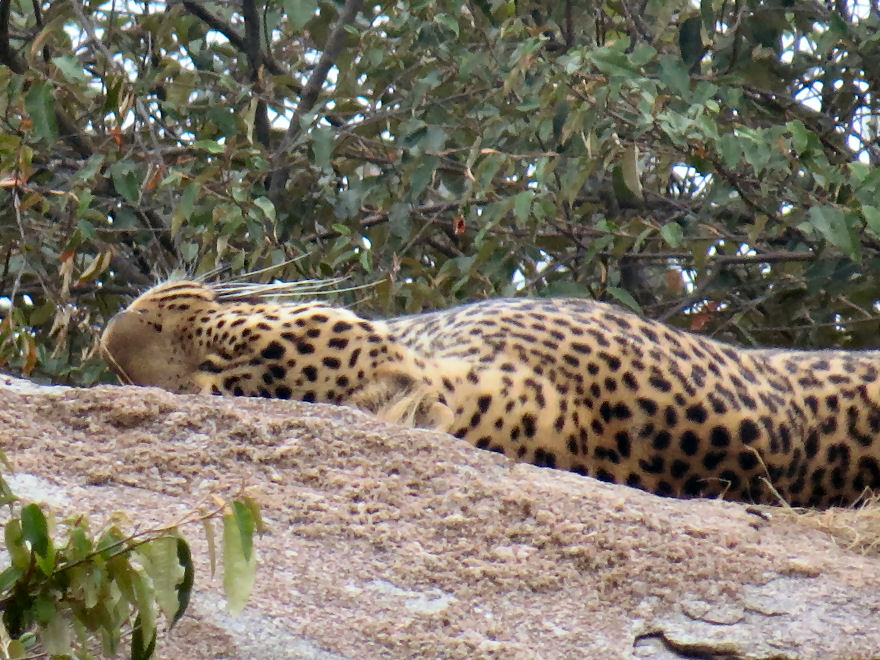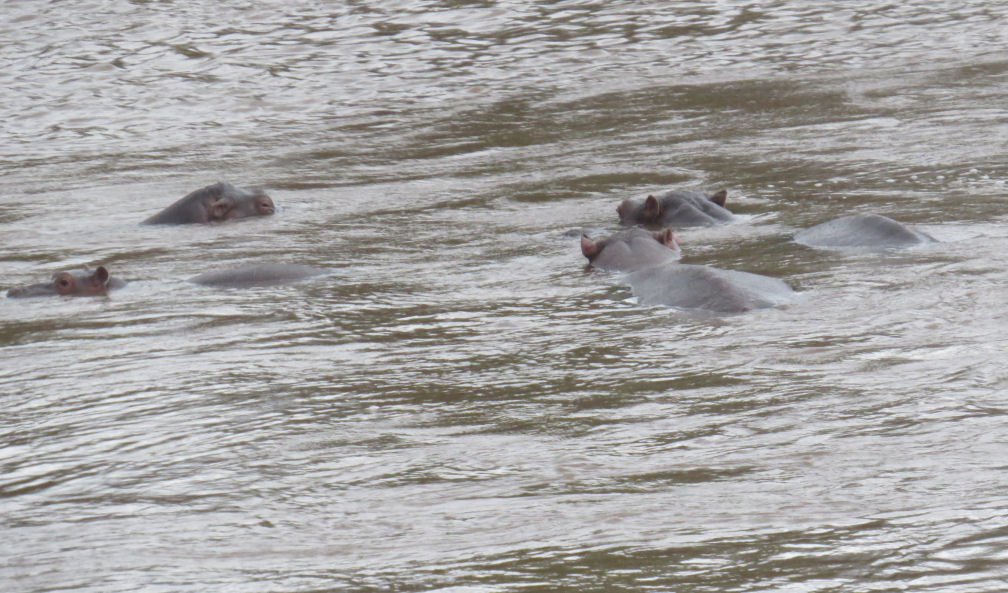It was a very eventful night. Although I slept fitfully, I felt pretty good when I woke up. I took my last Cipro with some confidence that my problems were all behind me.[1]
Our fivesome had once again agreed to take our breakfast in the bush. Before we left at 8 a.m. I decided to remove anything extraneous from my backpack. Since my camera was always strapped around my neck, I decided to stop carrying my camera case. The only thing in it was my spare battery, which I could easily carry in a pocket. The backpack seemed heavier to me than it should. I went through every section, and, to my great surprise and delight, I found my prescription sunglasses. I had not lost them after all.
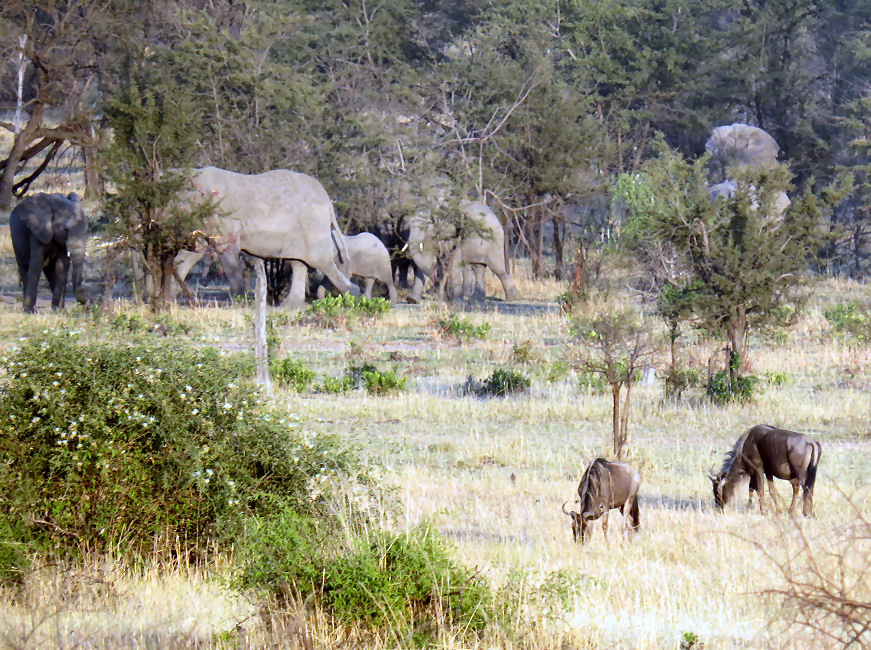
Upon our arrival at the trusty Land Cruiser, we learned from Belinda that hippos had been very near the camp during the night. These great beasts generally lay around in or near the water all day long, but at night they were out and about filling up their massive bellies with all kinds of vegetation.
Early in the morning everyone heard a very strange noise that was identified as the call of some hyenas. If you knew what all of the animals sounded like, you could enjoy a greatly enhanced experience in the bush. The abundance and diversity of the wildlife in the Serengeti almost defied belief.
Baraka asked us how we wanted to spend the morning. I, the only morning person in the group, had heard about the spectacularly chaotic crossing that some of the other people in the group had seen, and I was a bit jealous. I volunteered that we should try to see a crossing. The motion was passed 1-0 with four abstentions, although I think that Baraka would have broken the tie in my favor if someone suggested that we go look for a rhinoceros.
We drove down to crossing point #3, where we spotted some elephants on the other side of the Mara. We had only been there for a few minutes when wildebeests began gathering in large numbers. Pretty soon a few of them began descending the bank toward the river. No one wanted to be the first in the water, but as more and more of them descended, there was less and less room for standing.
The, all of a sudden it was on! The wildebeests were swimming (or maybe walking) right towards us. Pretty soon they reached our shore and climbed up our bank — on at first in front of us, but then behind us as well! This was not good. The wildebeests would probably be startled by our presence. In a large crossing it was critically important that the animals that had completed the crossing immediately begin walking away from the river at a good pace to avoid bottlenecks behind them. If even one frightened wildebeest decided to turn around or even stop, dozens or even hundreds could die.
Baraka understood this. He slammed the car into reverse, and he maneuvered the vehicle safely around the wildebeests and parked it nearby. From the new vantage point we could still see the crossing quite well, but we could not see them going up the bank on our side.
Many hundreds of wildebeests made the crossing. Once again they were crossing from north to south, the opposite of what I expected. Baraka never remarked on this except to say that they crossed in both directions.
The crossing did not last for a long time. At one point there was, for no apparent reason, a break. The animals on the other shore lost contact with the group in the water. A wildebeest's courage seemed to be greatly augmented by the presence of another one in front of it. Finally, one very brave soul, probably separated from her mother or her calf, decided to take the plunge. That daring act provoked another mini-crossing.
In the end a large number of wildebeests still remained on the far shore. They stood around for a few minutes wondering about whatever wildebeests wonder about. They then went back to searching for very short very green morsels of grass, as their kind is wont to do.
While we were watching, Baraka explained that all of the wildebeest calves are born during the rainy season, usually in February. However, Baraka noted that if the weather conditions were not right, the pregnant females could somehow extend their gestation period. He claimed that they were the only animals that could do that, but Betty said that American otters also have that ability.[2]
I used my monopod for the shots of the crossing. It was something of a pain to set up, but it seemed to help steady my hand. I took almost fifty photos, and only a couple came out a little blurry. I also used it for one really cool photo when the crossing had finished.
We next spotted a group of four elephants. We watched them tear apart some trees for a few minutes. Even the young ones attempted to help pull down branches, but they did not have much effect. Maybe they were just trying to build strength in their trunks, or maybe they just enjoyed playing tug-of-war.
We saw a hyena running and a red-necked spurfowl. I was unable to photograph the former, but the latter was not moving as quickly, and I think that I got a pretty good shot of it. I am not certain, however, because the bird's neck is not visible in the photo.
We did not need Waili to help us locate another business of mongooses. They were running in the road. For the first time I was able to get a decent photo of them.
I also photographed a pair of grey-backed shrikes. If the animals are reasonably still, I can usually be reasonably competent at taking their photos. I still was taking approximately one photo per day of my lens cover. There were no apparent holes in it yet.
On the way to the breakfast site we drove by a group of four elephants. Baraka stopped the vehicle. I concentrated on trying to get facial shots of the younger ones.
We stopped for breakfast near crossing point #7. I discovered that the array of foodstuffs at these events included bread and peanut butter. I was quite happy to restrict my intake to these two items and some juice.
From our vantage point we could see that a crossing was probably imminent.[3] We therefore hurriedly finished eating and climbed into the Land Cruiser. Baraka drove us to a spot near the crossing point, and the wildebeests did not disappoint us.
This crossing was not as big as the previous one, but it had two interesting aspects. The first was that it also involved zebras. The zebras waited until almost all of the wildebeests had crossed before they set out. They took their time, and it was evident that, except for the babies, they were walking, not swimming. The also did not seem to be affected by the current. Unlike the wildebeests, they were in no hurry to emerge from of the stream. Several stopped near the destination, looked around, and took a drink. All of the zebras crossed.
In contrast, fourteen wildebeests stayed on the far shore on the edge of the water. It was obvious that they wanted to join the others in the crossing, but for some reason they did not do it. I think that it is safe to say that science is still years away from understanding the psychology of these creatures. That does not, in fact, stop people from having opinions.
In fact, nearly everyone thinks that wildebeests are stupid. There average IQ is about 1. I began to wonder what would happen if there were a genius wildebeest that could score a 2 on an IQ test. Would he (or more likely she) be considered their Mozart, their Einstein, or maybe their Napoleon? Or would the outlier be considered dangerous, like a witch?
We saw a hippo strolling on the shore in broad daylight. This occurrence was unusual enough to merit inclusion in the journal.
We then saw a large herd of impalas, which, for some reason I did not photograph. We may not have even stopped, but Baraka did explain that baboons have a symbiotic relationship with impalas. I did not record the exact details, but it had something to do with looking out for leopards and lions.
We then encountered a secretarybird that was much easier to photograph than the one we had seen on Thursday.
We saw a Temminck's courser and some ostriches. At this point my right forefinger was too tired to snap photos of the latter.
Tom lost his hat again. Baraka had to retrieve it for him. This time it was fastened to his collar, but it still came off. The rest of us wore hats with strings a la Annie Oakley on TV.[4] We pulled them tight under our chins when it became very windy, or the ride was rough. They looked dorky, but they never flew off. Baraka wore a baseball cap. Evidently he had never read the guidebooks that advised so vigorously against such headgear.
Baraka liked to emphasize his experience, and he occasionally complained about the fact that some of the guides did not know the park very well. He said that one guide — not employed by Alex Walker — had been lost for four hours and never admitted as much to the tourists he was transporting. In addition to his mental map[5] of the area, Baraka had a GPS, a radio that he used frequently, and an eagle-eyed spotter.
We saw a tawny eagle and a martial eagle. I shot a presentable photo of at least one of them.
We saw hundreds of Thompson's gazelles. I rested my photo finger.
I was more appreciative of a big male eland that never took its eyes off of us.
Next we stopped to observe a group of four giraffes.
One of the highlights of the morning was the time that we spent in the company of an identifiably male lion, the first that we had seen. This fellow was not close to full-grown, but his mane was coming in, and he appeared to be proud of it. He even moved around a little bit, which is somewhat unusual for lions in daylight.
We headed back to camp for lunch after still another superb morning game drive. Belinda greeted us and showed us evidence that jackals had been in the camp and left us a present. It was still fresh.
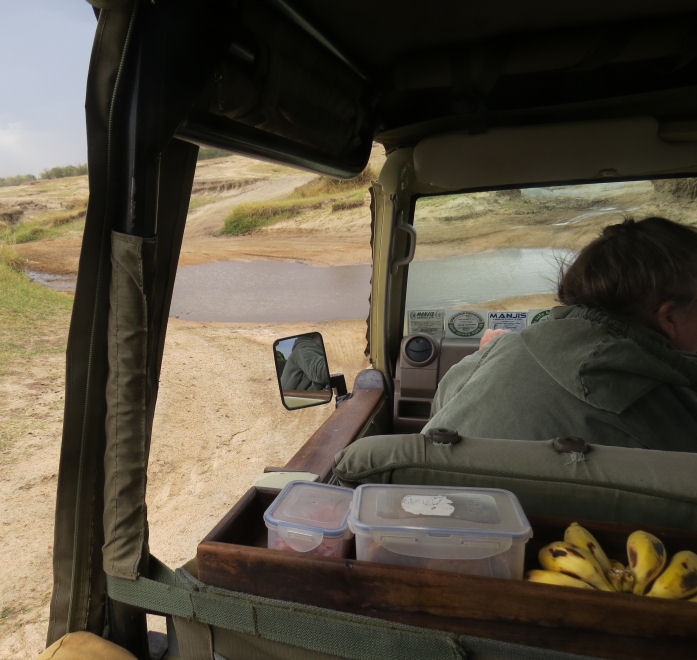
The drive ended with a short stop to see some more hippos, or maybe ones that we had already viewed. They needed to wear nametags. It started to sprinkle a little between 7 and 7:30. The gathering for the bonfire was therefore moved into the Nest. I actually liked this better because you could see more than the two people next to you, and the conversation seemed more lively. Sue, however, opted to stay outside and watch the campfire. I knew that she liked campfires, but it was very unusual for her to pass up a social occasion of any kind. The entrée at supper was beef. I was feeling better than I had since we set foot in Africa. I even chanced a glass of red wine. I enjoyed this supper more than any previous ones. I got to know the names of the other tourists. The two Minnesotans were named Andy and Chris. Sandy and Ann were from a part of Virginia with which I was not familiar. The three newcomers were Rich, Abby, and Ryan. They all were residents of Florida, but Rich and Abby met when Rich was associated with the ill-starred Harford Jai Alai venture back in the seventies. Their son, Ryan, was a physician. After supper somehow Robin Williams's name came up. I explained to everyone how he had stolen a joke from me.[8] Rich was able to match this with an interesting tale about his quip that his golf game was so bad that he needed to get his ball-retriever regripped. A cartoon was eventually drawn using this gag, and it was published. Abby told how she had gotten in trouble by repeating a joke that her father had told. It involved a woman in the water with a faulty bikini top. The punch line involved a child beseeching her "If you are going to drown those puppies, can I have the one with the pink nose?" Martin Mull's name also came up. I recounted how when we had seen him in Detroit in the seventies he had started his act by surveying the audience about their joke preferences. He began by telling the familiar story of Henry David Thoreau (in jail) and Ralph Waldo Emerson (visiting him). Silence ensued. He then started a second joke that began "Two fat black lesbians are sitting at a bar…" He did it much better than I did, and he got a much better reaction. I felt fine after supper, and I slept all night.
[1] Apologies to George Brett.
[2] Apparently quite a few mammals have the ability to time their offspring's birth due to environmental conditions. The name for this process is obligate diapause.
[3] Nothing is ever certain with the wildebeests, but when a large restless group congregates on the shore, they usually cross unless something spooks them.
[4] When I researched this, I was surprised to find that although Annie's hat was usually suspended on her back by the strings, when she wore it on her head, the strings always disappeared.
[5] There is also a nice physical map available #url here. I wish that we had had one. The curvy roads made it difficult for me to maintain my bearings.
